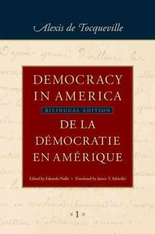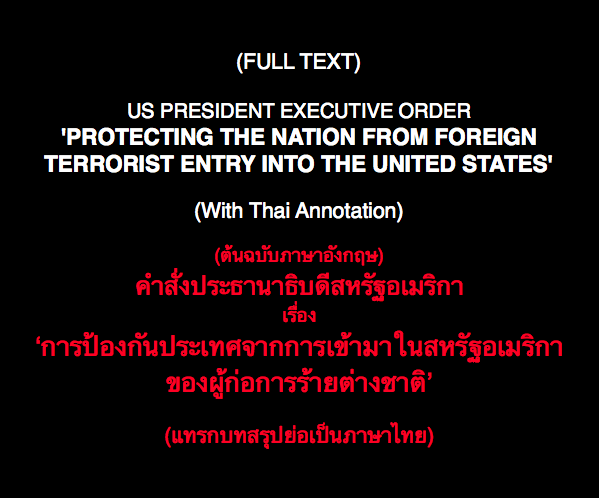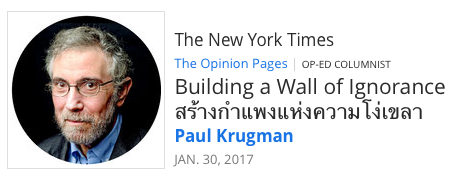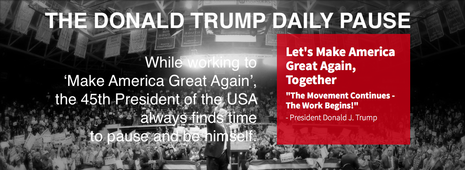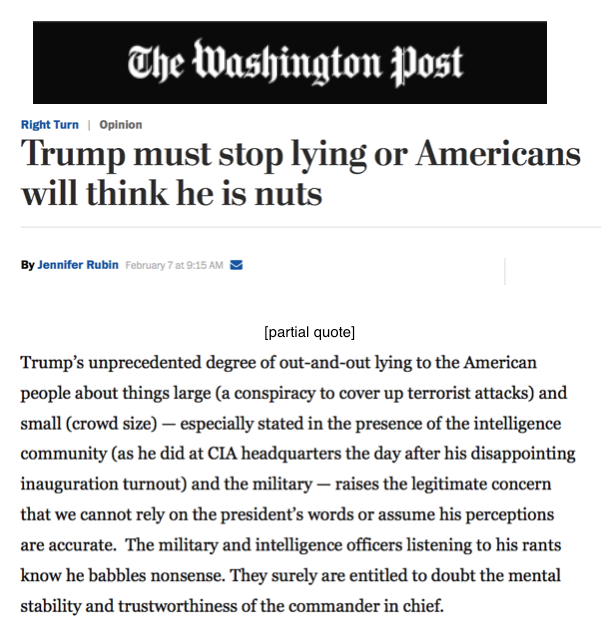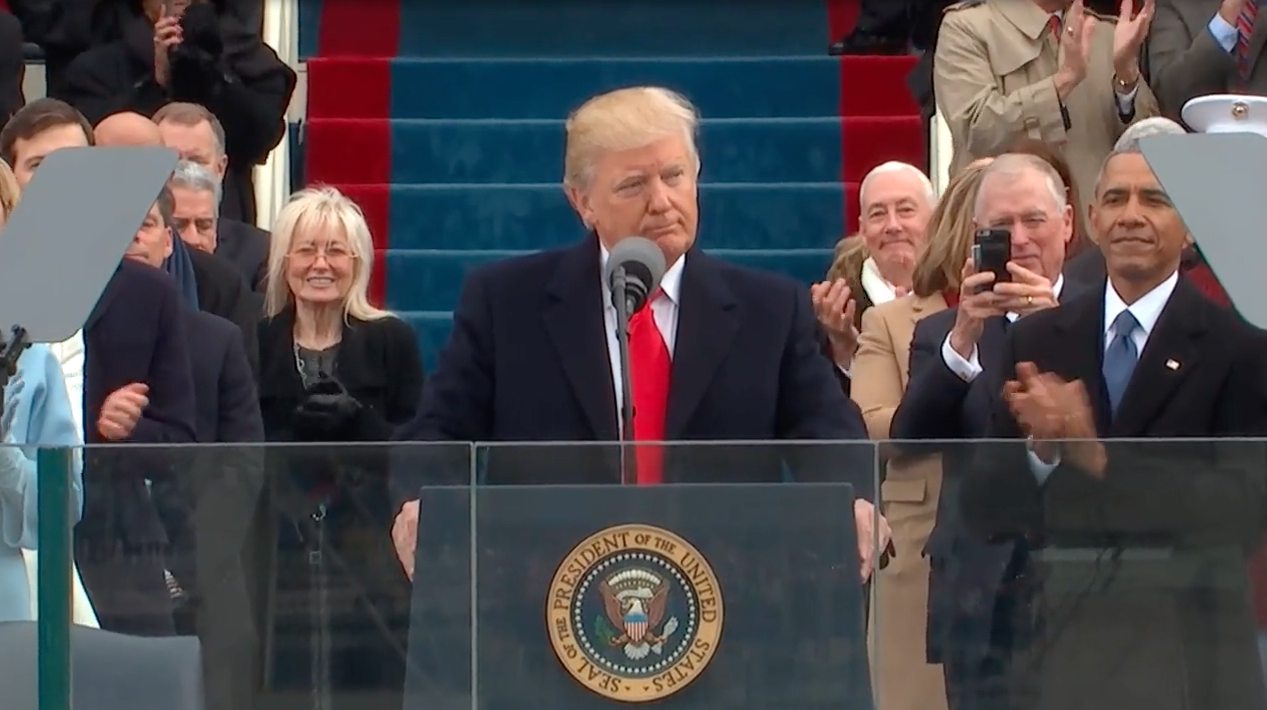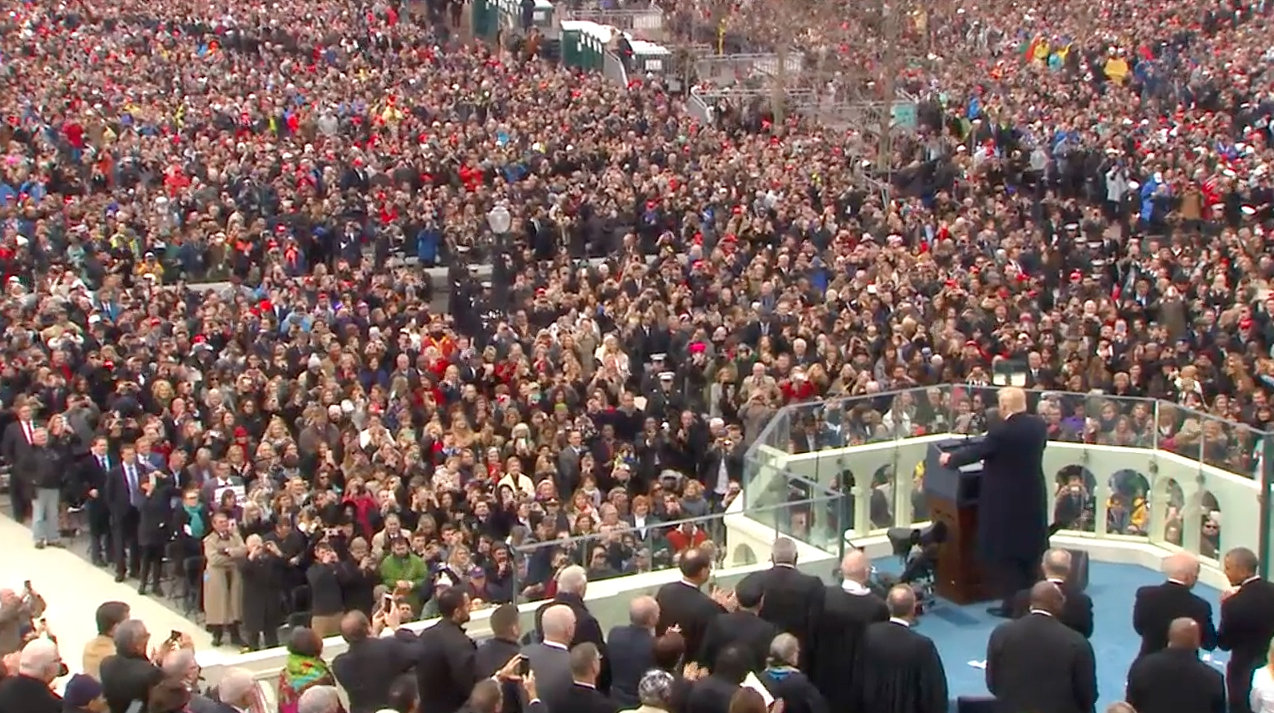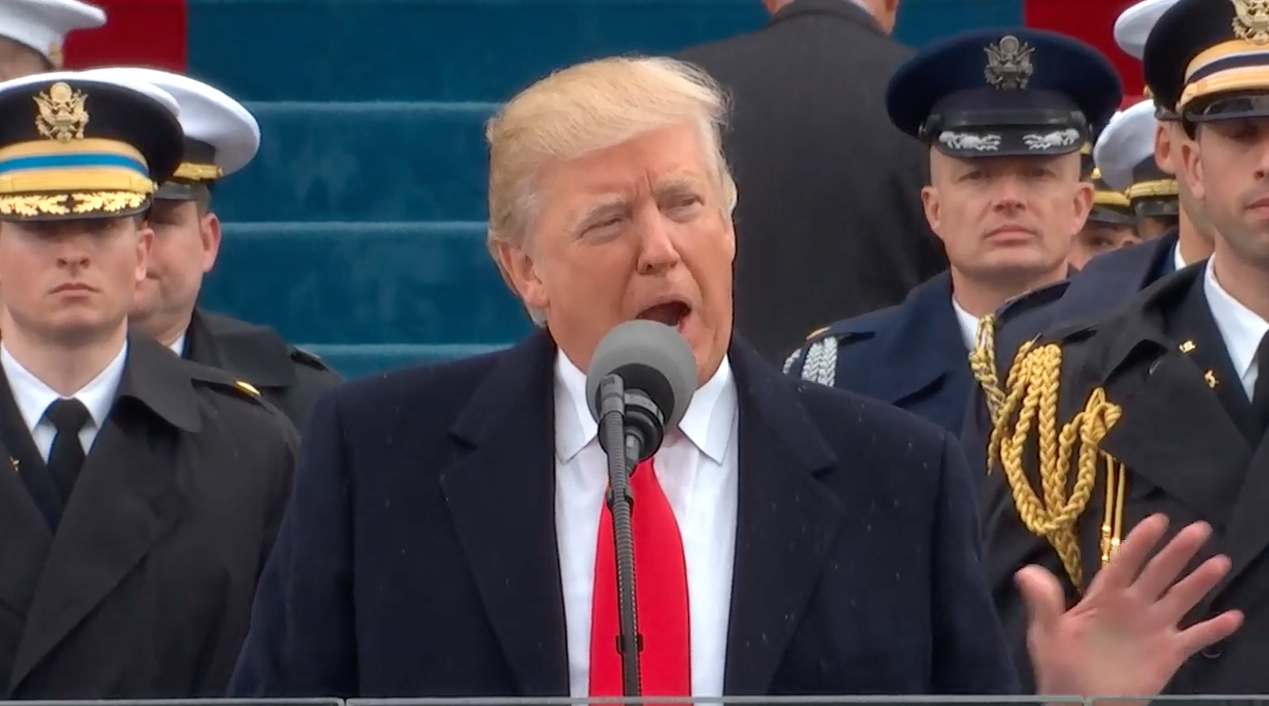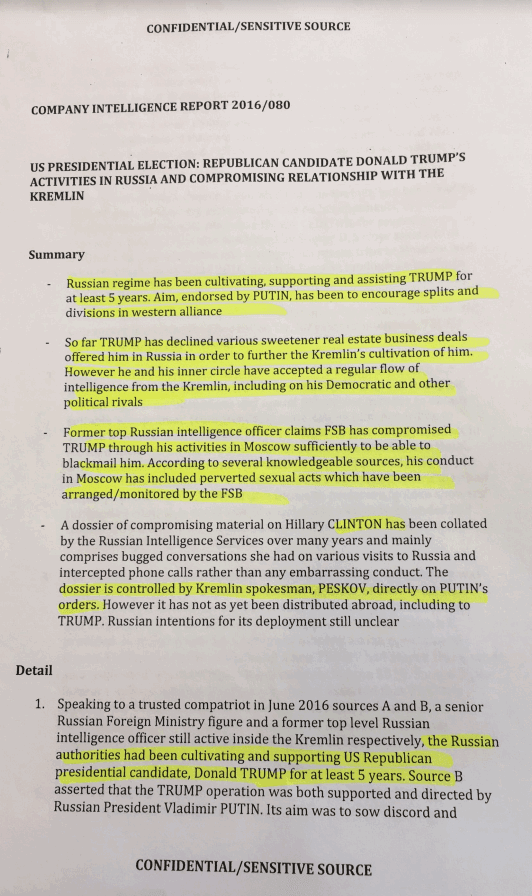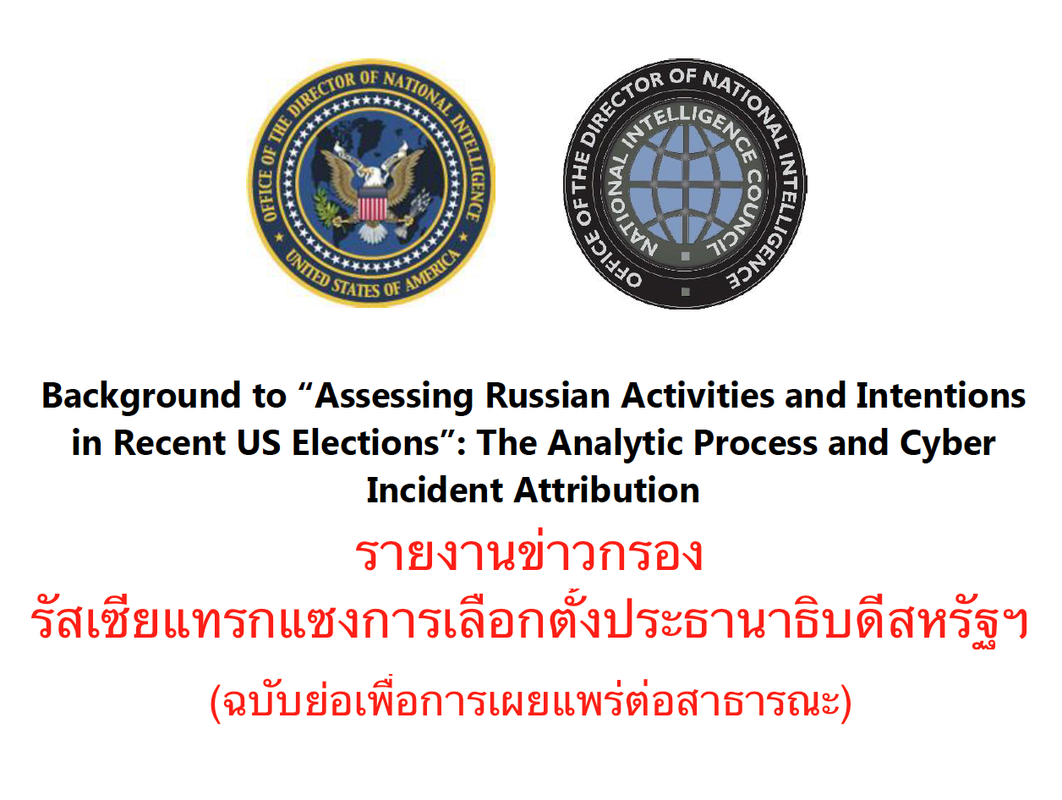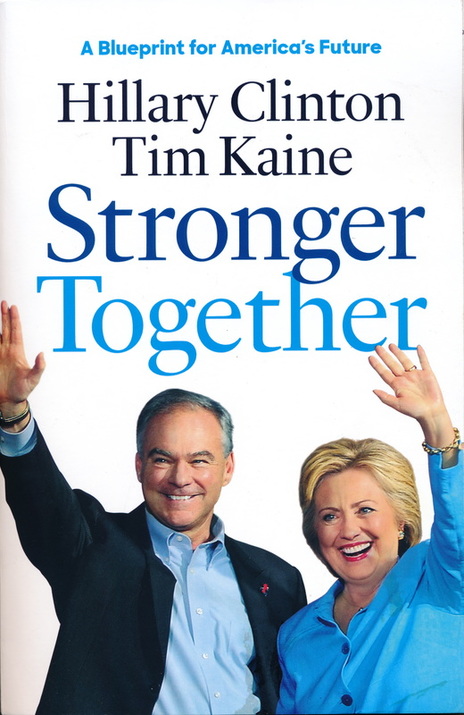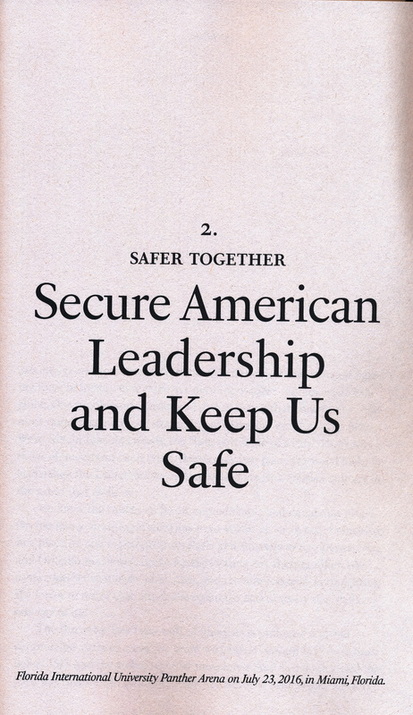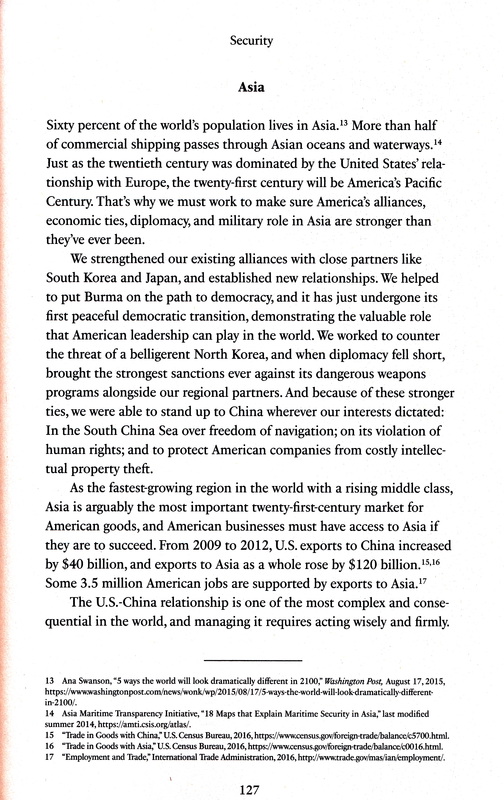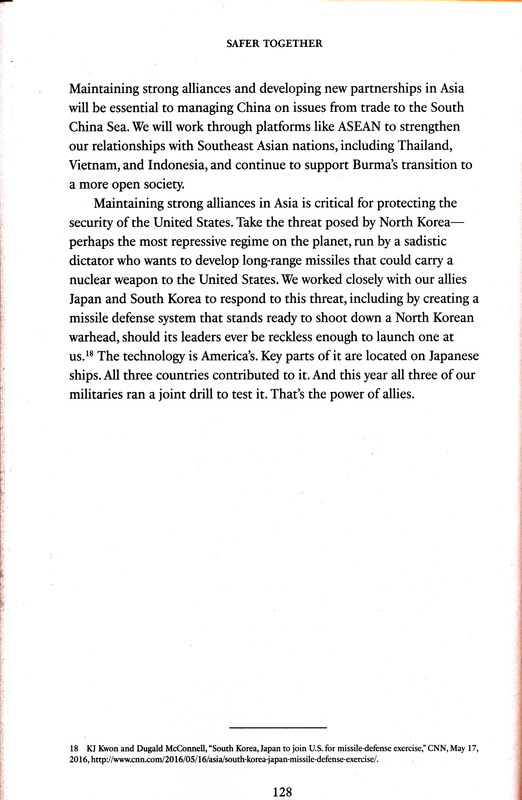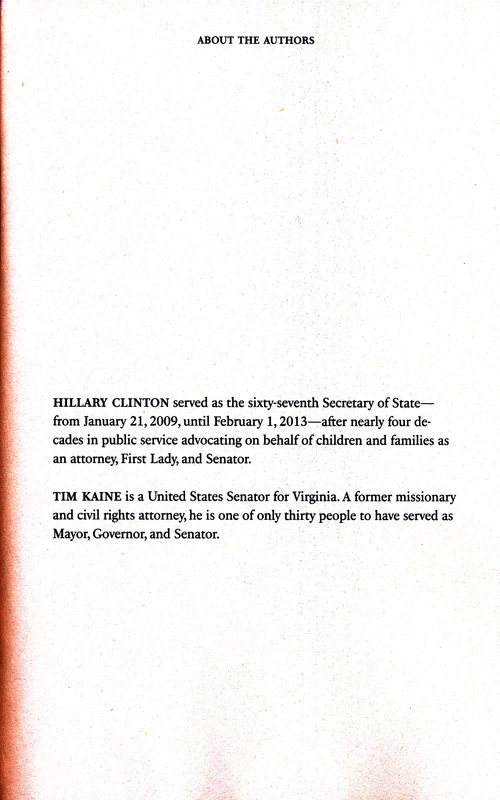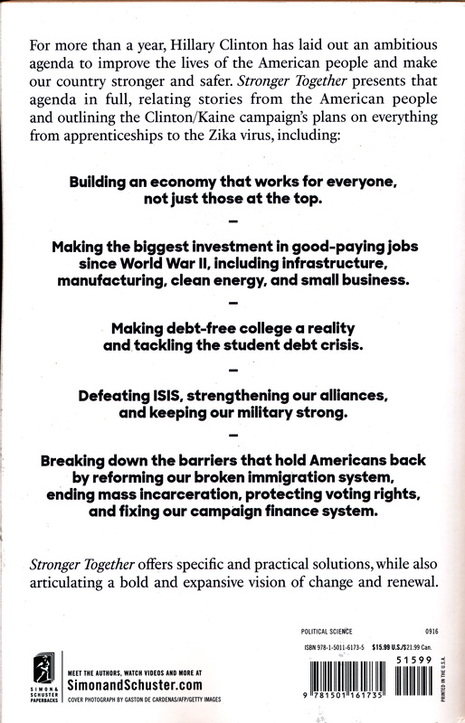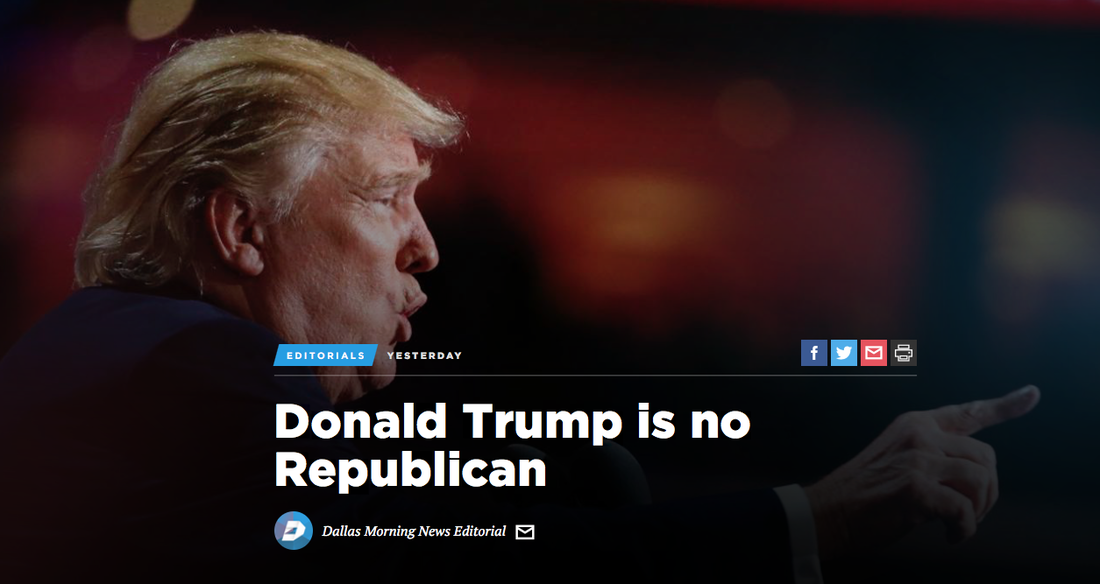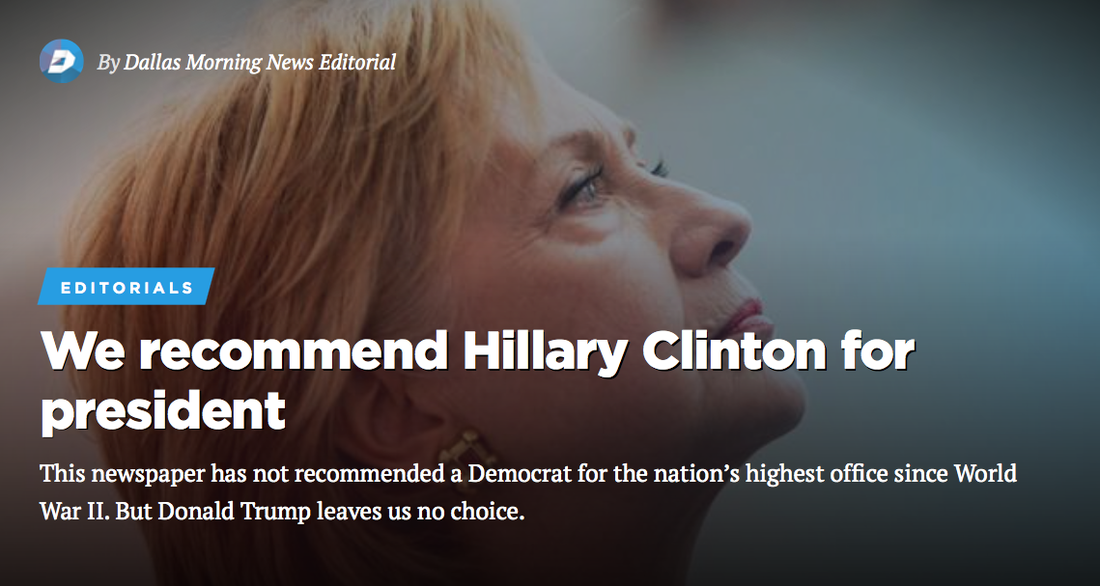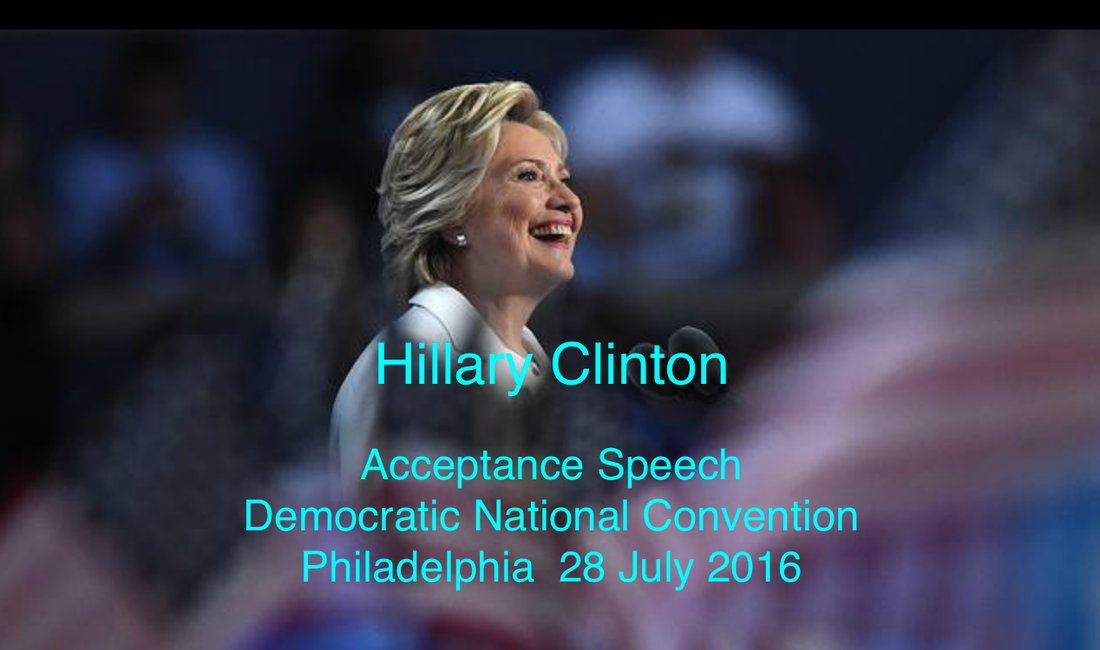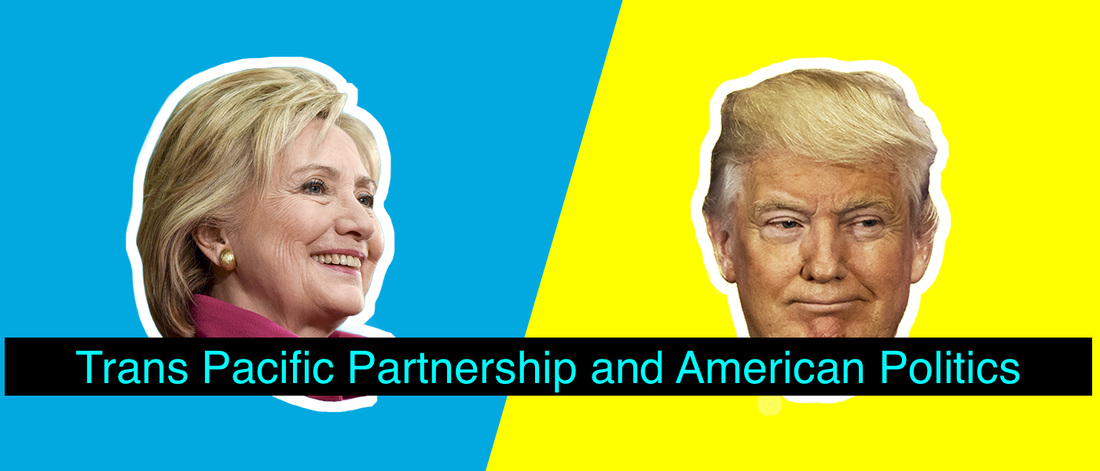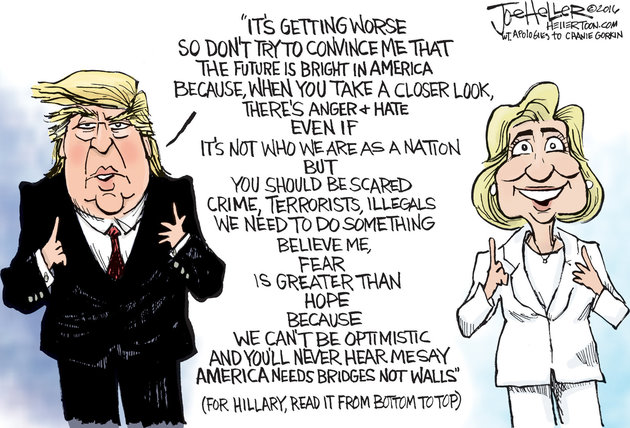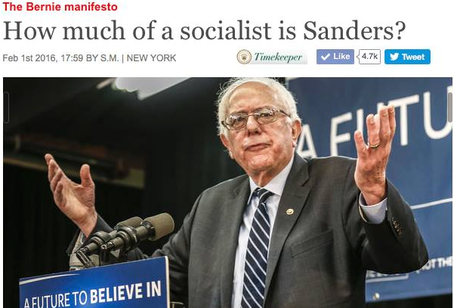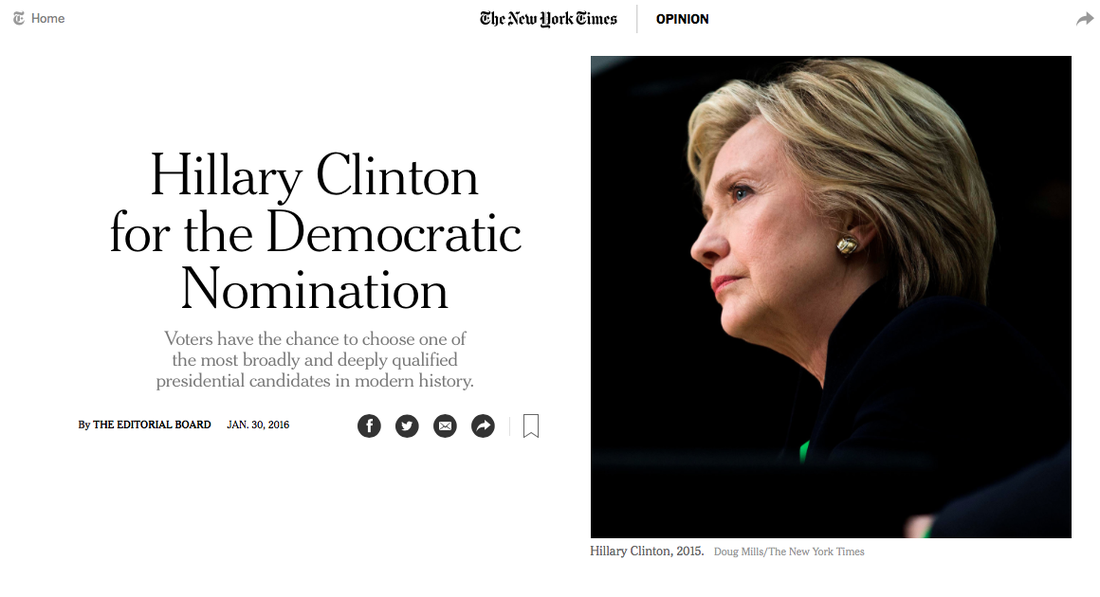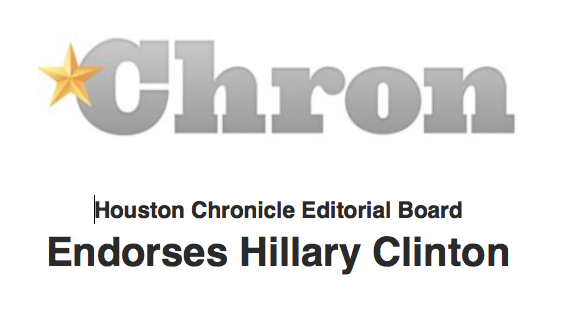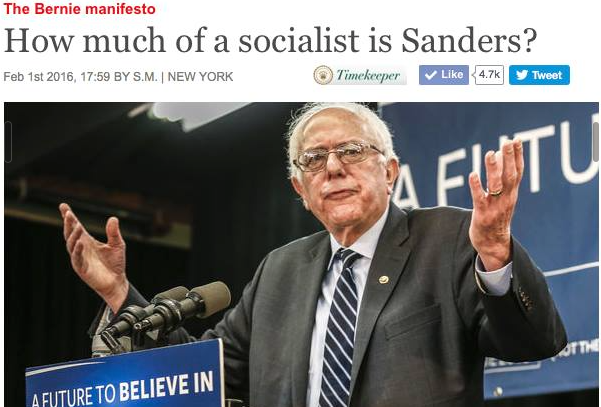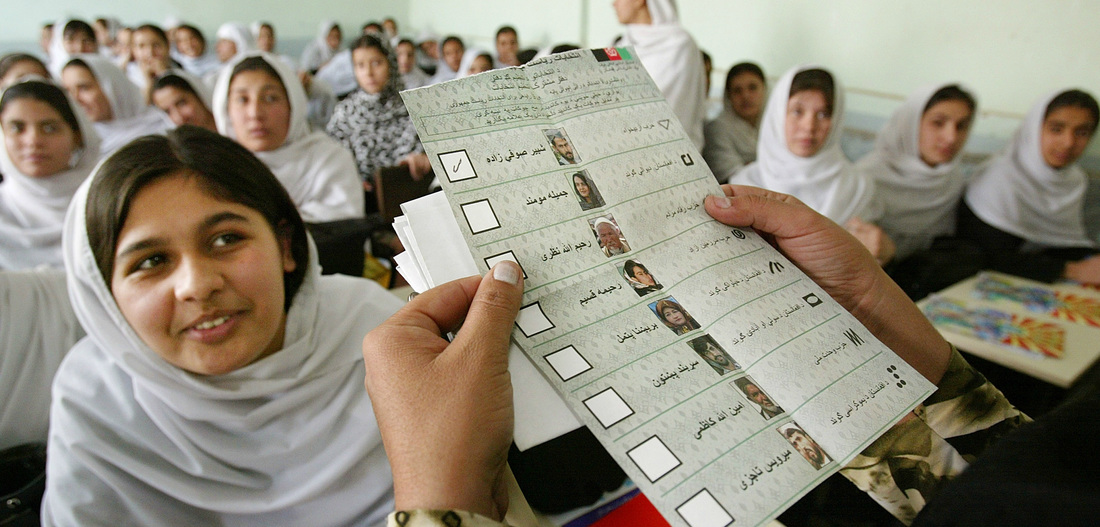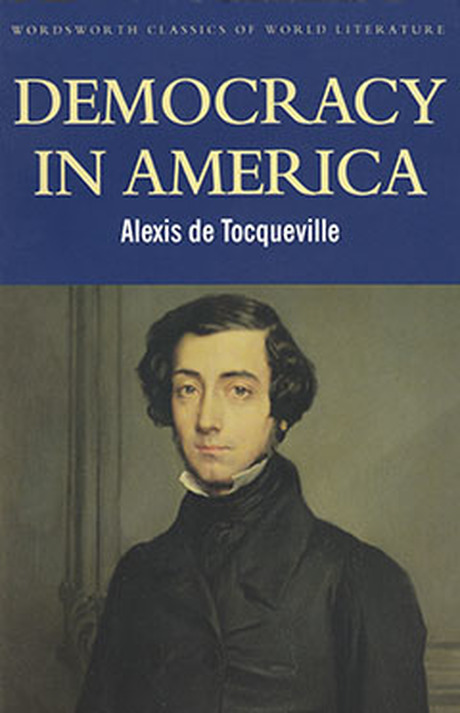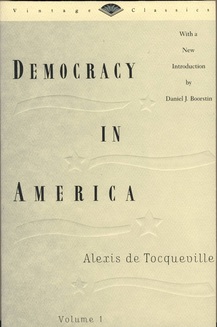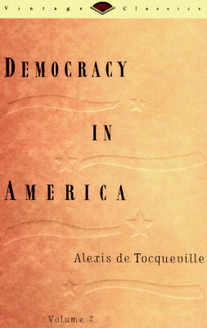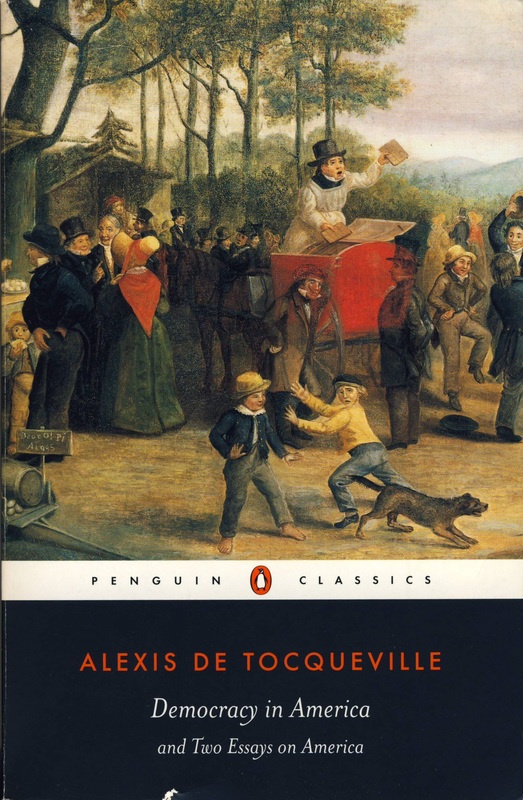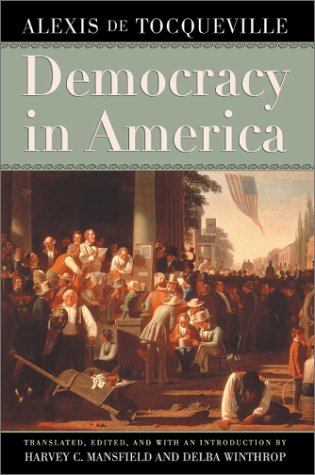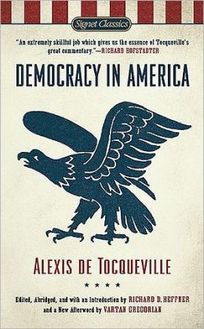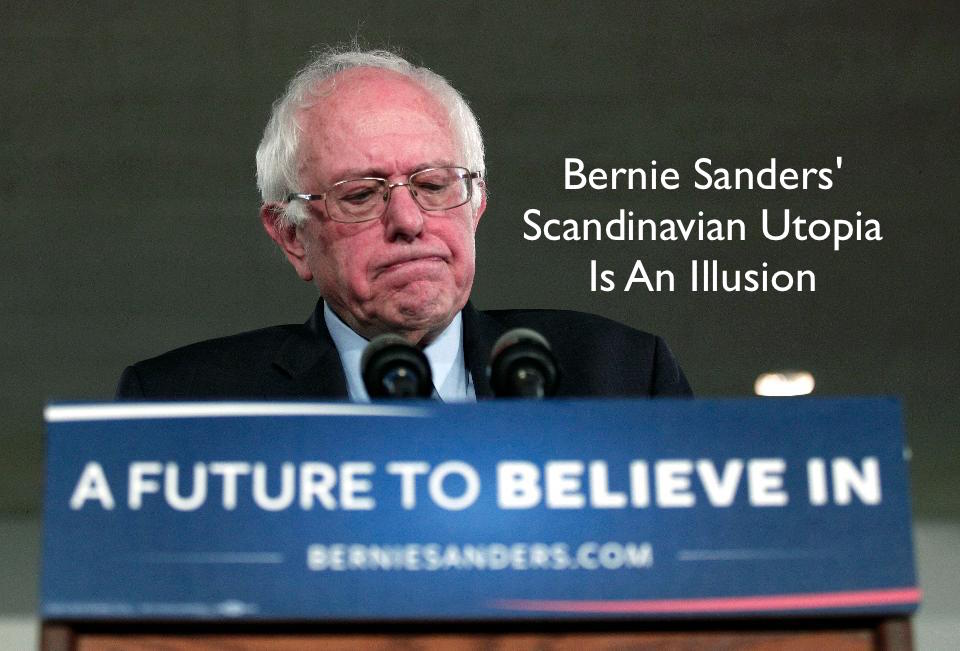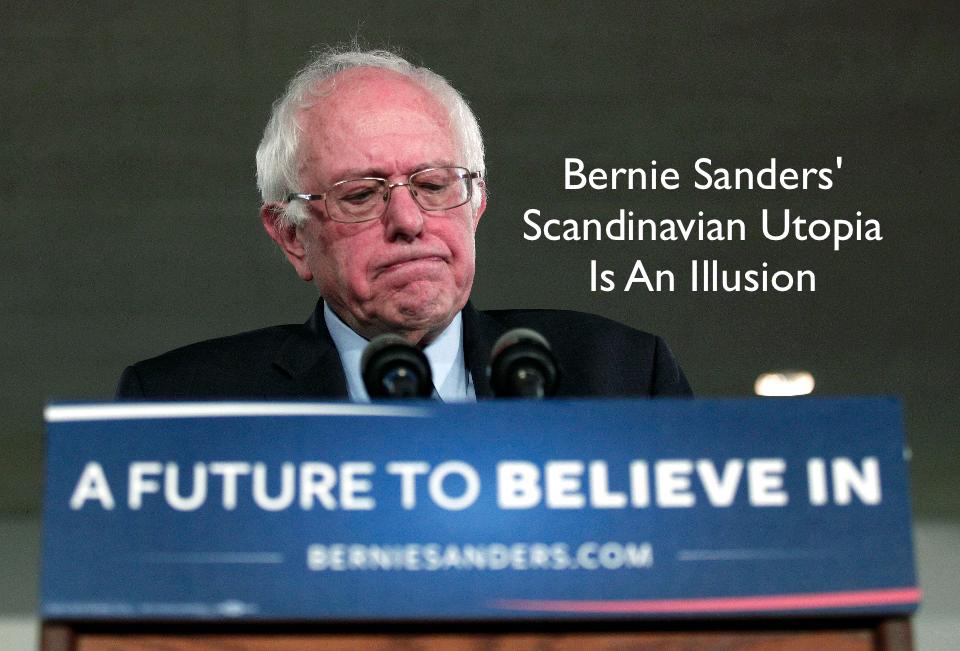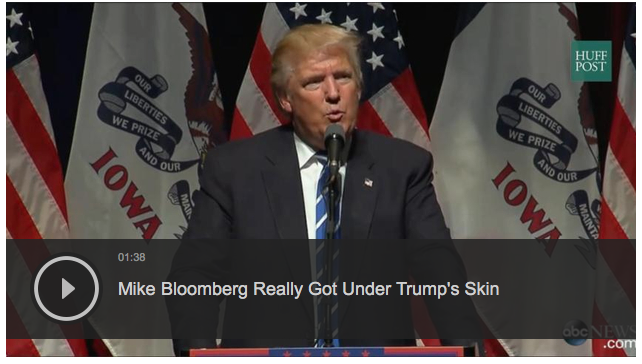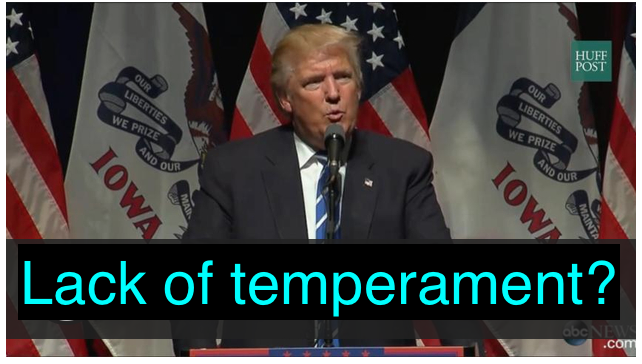|
DEMOCRACY IN AMERICA
ประชาธิปไตยในอเมริกา ข่าวสารความรู้เกี่ยวกับกระบวนการประชาธิปไตย การเมืองการปกครองในสหรัฐอเมริกา ตั้งแต่เริ่มประวัติศาสตร์อาณานิคมอเมริกาในคริสต์ศตวรรษที่ 17 ก่อนสงครามเพื่อกอบกู้เอกราช ผ่านสงครามกลางเมือง จนถึงการเป็นประเทศอภิมหาอำนาจสหรัฐอเมริกาปัจจุบัน ประชาธิปไตยในอเมริกาถือเป็นต้นแบบของประชาธิปไตยโลกปัจจุบัน ทว่ากาลเวลาผ่านไปกว่าสองร้อยปีแล้ว ขณะที่สหรัฐอเมริกายังคงใช้รัฐธรรมนูญฉบับเดิมฉบับเดียว แต่การเมืองในภาคปฏิบัติมีวิวัฒนาการหลากหลายจนเห็นปัญหาการเชื่อมต่อยุคสมัยแห่งสังคมประชาธิปไตย มีนักการเมืองกลุ่มหนึ่งเห็นว่าถึงวาระที่จะต้องปฏิรูปการเมืองในอเมริกาแล้ว เพราะระบบและกระบวนการทางการเมืองมีปัญหามาก ทั้งโครงสร้างอำนาจของรัฐบาลที่ส่วนกลางใหญ่เกินไปและมีอำนาจมากเกินไป อีกทั้งนักการเมืองก็ตกอยู่ใต้อิทธิพลของกลุ่มธุรกิจอุตสาหกรรมใหญ่และผู้มีความมั่งคั่งทั้งหลาย แทนที่จะใส่ใจรับฟังทุกข์สุขของบ้านเมืองเพื่อแก้ปัญหาให้กับประชาชน การเลือกตั้งประธานาธิบดีทุกสี่ปี และโดยเฉพาะในปี 2016 นี้ สะท้อนปัญหาประชาธิปไตยในอเมริกาอย่างชัดเจนมากกว่าครั้งใด. |
|
INAUGURAL SPEECH
by PRESIDENT DONALD J. TRUMP 20 JANUARY 2017 ------------------------- President Donald Trump's speech after taking the oath of office lasted approximately 16 minutes. The full text: ----------------- Chief Justice Roberts, President Carter, President Clinton, President Bush, President Obama, fellow Americans, and people of the world: Thank you.
We, the citizens of America, are now joined in a great national effort to rebuild our country and to restore its promise for all of our people. Together, we will determine the course of America, and the world, for many, many years to come. We will face challenges. We will confront hardships. But we will get the job done. Every four years, we gather on these steps to carry out the orderly and peaceful transfer of power, and we are grateful to President Obama and First Lady Michelle Obama for their gracious aid throughout this transition. They have been magnificent. Today's ceremony, however, has very special meaning. Because today we are not merely transferring power from one administration to another, or from one party to another - but we are transferring power from Washington, D.C. and giving it back to you, the people. For too long, a small group in our nation's capital has reaped the rewards of government while the people have borne the cost. Washington flourished - but the people did not share in its wealth. Politicians prospered - but the jobs left, and the factories closed. The establishment protected itself, but not the citizens of our country. Their victories have not been your victories; their triumphs have not been your triumphs; and while they celebrated in our nation's capital, there was little to celebrate for struggling families all across our land. That all changes - starting right here, and right now, because this moment is your moment: it belongs to you. It belongs to everyone gathered here today and everyone watching all across America. This is your day. This is your celebration. And this, the United States of America, is your country. What truly matters is not which party controls our government, but whether our government is controlled by the people. January 20th, 2017, will be remembered as the day the people became the rulers of this nation again. The forgotten men and women of our country will be forgotten no longer. Everyone is listening to you now. You came by the tens of millions to become part of a historic movement the likes of which the world has never seen before. At the centre of this movement is a crucial conviction: that a nation exists to serve its citizens. Americans want great schools for their children, safe neighbourhoods for their families, and good jobs for themselves. These are the just and reasonable demands of righteous people and a righteous public. But for too many of our citizens, a different reality exists: Mothers and children trapped in poverty in our inner cities; rusted-out factories scattered like tombstones across the landscape of our nation; an education system, flush with cash, but which leaves our young and beautiful students deprived of all knowledge; and the crime and the gangs and the drugs that have stolen too many lives and robbed our country of so much unrealised potential. This American carnage stops right here and stops right now. We are one nation - and their pain is our pain. Their dreams are our dreams; and their success will be our success. We share one heart, one home, and one glorious destiny. The oath of office I take today is an oath of allegiance to all Americans. For many decades, we've enriched foreign industry at the expense of American industry; Subsidised the armies of other countries while allowing for the very sad depletion of our military; We've defended other nations' borders while refusing to defend our own; And spent trillions and trillions of dollars overseas while America's infrastructure has fallen into disrepair and decay. We've made other countries rich while the wealth, strength, and confidence of our country has dissipated over the horizon. One by one, the factories shuttered and left our shores, with not even a thought about the millions and millions of American workers that were left behind. The wealth of our middle class has been ripped from their homes and then redistributed all across the world. But that is the past. And now we are looking only to the future. We assembled here today are issuing a new decree to be heard in every city, in every foreign capital, and in every hall of power. From this day forward, a new vision will govern our land. From this day forward, it's going to be only America First, America First. Every decision on trade, on taxes, on immigration, on foreign affairs, will be made to benefit American workers and American families. We must protect our borders from the ravages of other countries making our products, stealing our companies, and destroying our jobs. Protection will lead to great prosperity and strength. I will fight for you with every breath in my body - and I will never, ever let you down. America will start winning again, winning like never before. We will bring back our jobs. We will bring back our borders. We will bring back our wealth. And we will bring back our dreams. We will build new roads, and highways, and bridges, and airports, and tunnels, and railways all across our wonderful nation. We will get our people off of welfare and back to work - rebuilding our country with American hands and American labour. We will follow two simple rules: Buy American and hire American. We will seek friendship and goodwill with the nations of the world - but we do so with the understanding that it is the right of all nations to put their own interests first. We do not seek to impose our way of life on anyone, but rather to let it shine as an example - we will shine - for everyone to follow. We will reinforce old alliances and form new ones - and unite the civilised world against radical Islamic terrorism, which we will eradicate completely from the face of the Earth. At the bedrock of our politics will be a total allegiance to the United States of America, and through our loyalty to our country, we will rediscover our loyalty to each other. When you open your heart to patriotism, there is no room for prejudice. The Bible tells us: "How good and pleasant it is when God's people live together in unity." We must speak our minds openly, debate our disagreements honestly, but always pursue solidarity. When America is united, America is totally unstoppable. There should be no fear - we are protected, and we will always be protected. We will be protected by the great men and women of our military and law enforcement and, most importantly, we will be protected by God. Finally, we must think big and dream even bigger. In America, we understand that a nation is only living as long as it is striving. We will no longer accept politicians who are all talk and no action - constantly complaining but never doing anything about it. The time for empty talk is over. Now arrives the hour of action. Do not allow anyone to tell you that it cannot be done. No challenge can match the heart and fight and spirit of America. We will not fail. Our country will thrive and prosper again. We stand at the birth of a new millennium, ready to unlock the mysteries of space, to free the Earth from the miseries of disease, and to harness the energies, industries and technologies of tomorrow. A new national pride will stir our souls, lift our sights, and heal our divisions. It is time to remember that old wisdom our soldiers will never forget: that whether we are black or brown or white, we all bleed the same red blood of patriots, we all enjoy the same glorious freedoms, and we all salute the same great American Flag. And whether a child is born in the urban sprawl of Detroit or the windswept plains of Nebraska, they look up at the same night sky, they fill their heart with the same dreams, and they are infused with the breath of life by the same almighty Creator. So to all Americans, in every city near and far, small and large, from mountain to mountain, and from ocean to ocean, hear these words: You will never be ignored again. Your voice, your hopes, and your dreams, will define our American destiny. And your courage and goodness and love will forever guide us along the way. Together, we will make America strong again. We will make America wealthy again. We will make America proud again. We will make America safe again. And, yes, together, we will make America great again. Thank you, God bless you, and God bless America. Thank you. God bless America. [End of Speech] Reference: http://www.bbc.com/news/world-us-canada-38697653 ภาพจาก video ที่หนังสือพิมพ์ Washington Post https://www.washingtonpost.com/politics/trump-takes-office-vows-an-end-to-american-carnage/2017/01/20/4b2677d8-df4e-11e6-acdf-14da832ae861_story.html?hpid=hp_hp-bignews2_banner-hed%3Ahomepage%2Fstory&utm_term=.3666fc265ff5 |
Donald J. Trump เข้าพิธีสาบานตน
รับตำแหน่งประธานาธิบดีคนที่ 45 ของสหรัฐอเมริกา วันศุกร์ที่ 20 มกราคม 2017 หลังจากนั้นได้กล่าวสุนทรพจน์ยาว 16 นาที ต้นฉบับข้อความสุนทรพจน์ (แปลเป็นภาษาไทย โดย สมเกียรติ อ่อนวิมล) ท่านประธานศาลสูงสุด Roberts. ท่านประธานาธิบดี Carter, ท่านประธานาธิบดี Clinton, ท่านประธานาธิบดี Bush, ท่านประธานาธิบดี Obama, ประชาชนชาวอเมริกันทั้งหลาย, และประชาโลก: ขอขอบคุณ. เรา, พลเมืองแห่งอเมริกา, ร่วมกันในความพยายามระดับชาติในอันที่จะสร้างชาติของเราขึ้นใหม่ เพื่อให้เป็นไปตามที่สัญญาไว้กับประชาชนของเราทั้งมวล. เราจะกำหนดทิศทางของอเมริกา, และทิศทางของโลก, ในหลายๆปีข้างหน้าร่วมกัน. เราจะเผชิญกับความท้าทายต่างๆ จะเผชิญหน้ากับความยากลำบากต่างๆ แต่เราก็จะทำให้สำเร็จจนได้. ทุกสี่ปี เรามาชุมนุมกันที่เชิงบันได้แห่งนี้เพื่อที่จะเปลี่ยนถ่ายรับโอนอำนาจอย่างสันติและเป็นระเบียบเรียบร้อย และเราก็รู้สึกขอบคุณต่อประธานาธิบดี Obama และ ท่านสุภาพสตรีหมายเลขหนึ่ง Michelle Obama สำหรับความช่วยเหลือร่วมมืออย่างดีงามที่ให้มาโดยตลอดกระบวนการถ่ายโอนอำนาจนี้ ทั้งสองท่านช่วยเหลืออย่างดีเยี่ยม. อย่างไรก็ตาม, พิธีการในวันนี้นับว่ามีความหมายอย่างพิเศษมากๆ เพราะวันนี้มิใช่เป็นวันที่เพียงแค่ถ่ายโอนส่งต่ออำนาจจากรัฐบาลหนึ่งไปสู่อีกรัฐบาลหนึ่ง, หรือจากพรรคการเมืองหนึ่งไปยังอีกพรรคการเมืองหนึ่ง เท่านั้น - แต่ยังเป็นการส่งต่ออำนาจจากกรุง Washington, D.C. คืนกลับให้ท่านทั้งหลายผู้เป็นประชาชน. มันนานมากเกินไปแล้วที่คนกลุ่มเล็กๆที่เมืองหลวงของชาติเราได้ฉกฉวยหาประโยชน์จากการได้เป็นผู้ร่วมปกครองประเทศ ขณะเดียวกันที่ประชนกลับต้องเป็นฝ่ายผู้แบกภาระของชาติ. พวกคนที่กรุง Washington ก็มั่งคั่งรุ่งเรืองกันไป - แต่ประชาชนก็มิได้มีส่วนร่วมแบ่งปันความมั่งคั่งนี้ด้วยเลย. การเมืองก็มั่งคั่งรุ่งเรืองกันไป-แต่งานการในประเทศกลับหนีหายไปที่อื่น และโรงงานผลิตสินค้าทั้งหลายก็ต้องปิดตัวลง. พวกกลุ่มคนคุมฐานอำนาจเก่าปกป้องตัวเองได้ แต่ประชาชนของเรากลับปกป้องดูแลตัวเองไม่ได้. ชัยชนะของพวกเขา ไม่ใช่ชัยชนะของพวกท่าน; ความสำเร็จของพวกเขาไม่ใช่ความสำเร็จของพวกท่าน; ขณะที่พวกนักการเมืองเก่าเฉลิมฉลองกันที่เมืองหลวงของประเทศของเรานั้น เหล่าครอบครัวทั้งอเมริกาที่ต้องต่อสู้แบบปากกัดตีนถีบไม่มีอะไรจะร่วมฉลองด้วย ทั้งหมดนี้จะไม่เหมือนเดิมอีกต่อไปแล้ว เริ่มที่นี่ ตอนนี้เลย เวลานี้เป็นเวลาของท่าน: ท่านเป็นเจ้าของครอบครองโอกาสนี้แล้ว มันเป็นเวลาของทุกคนที่มาร่วมชุมนุมกันที่นี่ วันนี้ และทุกๆคนทั่วอเมริกาที่กำลังดูอยู่ตอนนี้ วันนี้เป็นวันของท่าน เป็นงานเฉลิมฉลองของท่าน และนี่ สหรัฐอเมริกา เป็นประเทศของท่าน. สิ่งสำคัญแท้จริงไม่ใช่เรื่องว่าพรรคการเมืองใดจะได้คุมอำนาจรัฐบาล แต่มันสำคัญที่ว่าประชาชนจะได้ควบคุมอำนาจรัฐบาลหรือไม่. วันที่ 20 มกราคม 2017 จะเป็นวันที่จดจำไว้ว่าประชาชนได้กลายมาเป็นผู้ปกครองประเทศนี้อีกครั้ง หนึ่ง ประชาชนของประเทศ ทั้งชายและหญิงที่ถูกลืม จะไม่ถูกลืมอีกต่อไปแล้ว ตอนนี้เสียงร้องของทุกท่านได้รับการตอบสนองแล้ว ท่านมากันเป็นจำนวนสิบๆล้าน มาร่วมเป็นเป็นส่วนหนึ่งของชบวนการแห่งประวัติศาสตร์อย่างที่โลกไม่เคยได้พบเห็นมาก่อน ณ ศูนย์กลางแห่งขบวนการนี้คือความมุ่งมั่นอันยิ่งยวดว่าประเทศชาติจะอยู่เพื่อรับใช้ประชาชน ชาวอเมริกันต้องการโรงเรียนชั้นเยี่ยมสำหรับลูกหลาน, ต้องการชุมชนที่ครอบครัวอยู่ได้อย่างปลอดภัย, และต้องการให้ตัวเองมีงานดีๆทำ นี่คือข้อเรียกร้องต้องการที่ยุติธรรมและสมเหตุสมผล เป็นสิทธิสมบูรณ์ของ สำหรับประชาชนและสาธารณชนทั้งมวล ทว่าสำหรับพลเมืองจำนวนมากเหลือเกินที่ชีวิตจริงมิได้เป็นเช่นนั้น: คนเป็นแม่ กับลูกๆกลับถูกปล่อยให้จมปลักอยู่ในความยากจน ในชุมชนทรุดโทรมในเมือง; โรงงานอุตสาหกรรมเสื่อมโทรมสนิมเกราะเขรอะ กระจายให้เห็นเป็นภูมิทัศน์เหมือนสุสานอยู่ทั่วประเทศของเรา; และระบบการศึกษา ทั้งๆที่จัดงบประมาณให้ท่วมท้นแต่เด็กนักเรียนผู้น่ารักกลับถูกทำให้ด้อยความรู้; แล้วก็เรื่องอาชญากรรม เรื่องแก๊งค์คนเกเร เรื่องยาเสพย์ติด ที่คร่าชีวิตไปมากมาย ขโมยศักยภาพของคนในชาติไปจนไม่อาจบรรลุถึงที่สุดของศักยภาพพลเมืองได้ สภาวะหายนะแห่งอเมริกาที่ว่ามานี้ ต้องจบลงที่นี่ วันนี้เลย. เราเป็นชาติหนึ่งเดียวกัน ความปวดร้าวของประชาชน คือความปวดร่วมของเราด้วย ความฝันของประชาชน คือความฝันของเราด้วย; ความสำเร็จของพวกเขา จะเป็นความสำเร็จของพวกเราด้วย เราร่วมหัวใจเดียวกัน บ้านเดียวกัน และชตากรรมอันสุดประเสริฐเดียวกัน. คำสาบานตนรับตำแหน่งของผม คือคำสาบานตนที่จะซื่อสัตย์ภักดีต่อประชาชนอเมริกันทั้งมวล. หลายทศวรรษที่ผ่านมา เราได้สร้างความมั่งคั่งรุ่งเรืองให้กับกิจการอุตสาหกรรมต่างชาติ บนค่าความเสียหายของอุตสาหกรรมอเมริกัน; เอาเงินไปอุดหนุนสนับสนุนกองทัพชาติอื่นๆ ขณะที่ปล่อยให้กองทัพของเราเองอ่อนแอสิ้นเรี่ยวแรงอย่างน่าเศร้าใจ; เรามัวแต่ไปปกป้องพรมแดนชาติอื่นๆ แต่กลับไม่ปกป้องพรมแดนของเราเอง; ใช้เงินมหาศาลไม่รู้กี่ล้านล้านดอลล่าร์ในต่างประเทศ แต่กลับปล่อยให้โครงสร้างพื้นฐานของอเมริกาทรุดโทรมปรักหักพัง. เราทำให้ประเทศอื่นๆร่ำรวย ขณะที่ความมั่งคั่ง เข้มแข็ง และความมั่นใจในประเทศเราเองเสื่อมถอยหายลับขอบฟ้า. โรงงานแล้ว โรงงานเล่า ทยอยล่มสลาย และโยกย้ายหายออกไปนอกประเทศ ไม่มีการคิดถึงห่วงใยคนงานอเมริกันนับล้านๆคนที่ถูกทอดทิ้งกันเลย ความมั่งคั่งในหมู่ชนชั้นกลางถูกดึงทึ้งฉีกขาดออกไปจากครอบครัวแล้วก็เอาไปกระจายแจกจ่ายให้กับคนทั่วโลก แต่นั่นมันอดีตแล้ว มาบัดนี้เรามองแต่อนาคตเท่านั้น เรามาร่วมชุมนุมกันที่นี่ เพื่อประกาศระเบียบวาระใหม่ให้เป็นที่รับรู้กันในทุกเมือง, ทุกเมืองหลวงของต่างประเทศ, และทุกหนแห่งอันเป็นถิ่นฐานแห่งอำนาจ. นับจากวันนี้เป็นต้นไป วิสัยทัศน์ใหม่จะเข้ามาปกครองบ้านเมืองของเรา นับจากวันนี้เป็นต้นไป อเมริกาเท่านั้นที่ต้องมาก่อน อเมริกามาก่อน. การตัดสินใจทุกเรื่องเกี่ยวกับการค้า, ภาษีอากร, เรื่องการอพยพเข้าเมือง, การต่างประเทศ, จะเป็นการตัดสินใจเพื่อให้ได้ประโยชน์แก่คนอเมริกันและครอบครัวอเมริกัน. เราต้องปกป้องพรมแดนของเราจากการบุกรุกกร้ำกรายจากประเทศ อื่นๆ ที่มาแย่งผลิตสินค้าของเรา, ขโมยบริษัทต่างๆของเราไป, และมาทำลายตำแหน่งงานต่างๆของเรา การปกป้องตัวเราจะนำไปสู่ความมั่งคั่ง และพลังเข้มแข็ง ผมจะสู้เพื่อท่านทุกลมหายใจเข้าออกของร่างกายผม - และผมจะไม่, ไม่ทำให้ท่านผิดหวัง. อเมริกาจะเริ่มเป็นผู้ชนะอีกครั้งหนึ่ง ชนะแบบที่ไม่เคยชนะมาก่อน เราจะเอางานกลับมาให้ทำกัน เราจะเอาพรมแดนของเราคืนมา เราจะเอาความมั่งคั่งร่ำรวยคืนมา เราจะเอาความฝันของเรากลับคืนมา เราจะสร้างถนนใหม่ สร้างทางหลวงใหม่ สร้างสะพาน, และ สนามบิน, อุโมงค์, ทางรถไฟ, สร้างให้ทั่วประเทศอันอัศจรรย์ของเรา. เราจะทำให้ประชาชนหลุดพ้นจากระบบสวัสดิการสังคม แล้วให้กลับเข้าสู่ภาวะการมีงานทำ - สร้างประเทศของเรากันใหม่ ด้วยมือและแรงงานของคนงานอเมริกัน. เราจะทำตามกฎง่ายๆสองข้อ: ซื้อสิ้นค้าอเมริกัน และ จ้างงานคนอเมริกัน เราประสงค์จะสร้างมิตรภาพพร้อมกับส่งความปราถนาดีต่อนานาชาติในโลก - แต่ว่าเราจะทำด้วยความเข้าใจว่ามันเป็นสิทธิ์ของชาติทั้งหลายที่จะคิดถึงประโยชน์ของชาติตนเองก่อนชาติอื่นๆ. เรามิได้มีความต้องการที่จะไปบังคับให้ใครๆต้องมาดำเนินวิถีชีวิตแบบเรา เราเพียงต้องการให้วิถีชีวิตแบบเราส่องประกายให้เห็นเป็นแบบอย่าง - เราจะเปล่งประกายให้คนอื่นตามแบบอย่างเรา. เราจะเสริมพลังเข้มแข็งให้กับพันธมิตรเก่าของเรา แล้วจะสร้างพันธมิตรใหม่ๆขึ้นเพิ่มเติม - และสร้างสามัคคีขึ้นในโลกศิวิไลซ์ ต่อต้านพวกอิสลามก่อการร้ายหัวรุนแรง ซึ่งเราจะกำจัดกวาดล้างไปให้สิ้นโลก. ณ รากฐานสำคัญของการเมืองของเรา เราจะมีแต่ความยึดมั่นเหนียวแน่นสมบูรณ์ต่อสหรัฐอเมริกา และด้วยความจงรักภักดีต่อประเทศของเราเช่นนี้ เราก็จะได้ค้นพบความจงรักภักดีต่อกันและกันด้วยอีกครั้งหนึ่ง. เมื่อท่านเปิดใจของท่านให้กับเลือดรักชาติ ก็จะไม่มีวันเกิดความคิดกีดกันชิงชังกันและกัน. พระคัมภีร์ไบเบิ้ล บอกเราว่า: "เป็นเรื่องน่ายินดีและเป็นสุขยิ่ง เมื่อคนของพระเจ้าอยู่ร่วมกันอย่างสมานสามัคคี." เราจะต้องพูดออกจากใจอย่างเปิดเผย ถกเถียงเรื่องความเห็นที่แตกต่างกันอย่างบริสุทธิ์ใจ แต่ก็จะต้องรักษาความเป็นหนึ่งเดียวกันให้คงอยู่ตลอดเวลา. เมื่ออเมริกาสามัคคีกัน ก็ไม่มีอะไรจะมาหยุดยั้งอเมริกาได้. ไม่ควรจะต้องหวาดกลัวอะไร - เราได้รับการปกป้องคุ้มครองแล้ว และจะได้รับการปกป้องคุ้มครองตลอดไป เราจะได้รับการปกป้องคุ้มครองจากชายหญิงผู้ยิ่งใหญ่แห่งกองทหารของเรา จากหน่วยรักษากฎหมาย และที่สำคัญที่สุด เราจะได้รับการปกปักรักษาจากพระเจ้า ท้ายที่สุดนี้ เราจะต้องคิดการให้ใหญ่ยิ่ง และฝันให้ยิ่งใหญ่. ในอเมริกา เราเข้าใจว่าประเทศชาติจะมีชีวิตก็ต่อเมื่อประเทศเจริญก้าวหน้าเท่านั้น. เราจะไม่สามารถยอมรับพวกนักการเมืองที่เอาแต่พูด แล้วไม่ทำอะไรเลยอีกต่อไป - พวกนัการเมืองที่เอาแต่บ่น แต่ไม่เคยทำอะไรที่จะเป็นการแก้ปัญหาเลย. หมดเวลาแล้วสำหรับคำพูดที่ว่างเปล่า ไร้แก่นสาร. เวลาของการทำจริงมาถึงแล้ว. ขอท่านจงอย่างให้ใครมาบอกว่าอะไรๆมันทำไม่ได้ ไม่มีอะไรจะท้าทายเท่ากับการท้าทายหัวใจ พลังต่อสู้ และจิตวิญญาณแห่งอเมริกา เราจะไม่ล้มเหลว ประเทศของเราจะรุ่งเรืองมั่งคั่งอีกครั้ง เราอยู่ ณ ต้นสหัสวรรษใหม่ พร้อมที่จะเบิกทางไปไขความลึกลับทั้งหลายในห้วงอวกาศ ทำให้โลกปลอดจากความทุกข์จากเชื้อโรคร้าย หาแหล่งพลังงาน การอุตสาหกรรม และเทคโนโลยีแห่งอนาคต. ความภาคภูมิใจแห่งชาติที่เกิดขึ้นใหม่จะกระตุ้นจิตวิญญาณของเรา ทำให้สายตาเราเห็นอะไรๆกว้างไกล และสร้างความปรองดองต่อกัน. ถึงเวลารำลึกถึงปัญญาญาณที่บรรดาทหารเก่าไม่เคยลืม นั่นคือที่พูดว่า ไม่ว่าเราจะผิวดำ น้ำตาล หรือผิวขาว เราทุกคนมีเลือดรักชาติสีแดงเหมือนกัน เราทุกคนมีเสรีภาพอันประเสริฐยิ่ง เราทั้งหลายเคารพธงชาติอเมริกันเหมือนกันทุกคน. และ ไม่ว่าเด็กน้อยคนหนึ่งจะเกิดในเขตชานเมือง Detroit อันแน่นขนัด หรือจะเกิดในทุ่งลมแรงแห่ง Nebraska เด็กน้อยทุกคนมองเห็นท้องฟ้ายามราตรีฟ้าเดียวกัน เด็กๆเหล่านั้นมีฝันแบบเดียวกันอยู่เต็มหัวใจ เด็กๆเหล่านั้นมีลมหายใจเป็นชีวิตขึ้นมาก็ด้วยพระเจ้าองค์เดียวกันทรงเป็นผู้ให้กำเนิดชีวิต. ดังนั้น ชาวอเมริกันทั้งหลาย ไม่ว่าจะอยู่ ณ เมืองใด ใกล้หรือไกล เล็กหรือใหญ่ จากขุนเขาสู่ขุนเขา จากมหาสมุทรสู่มหาสมุทร ขอท่านจงฟังคำนี้ไว้: จะไม่มีใครมินเฉยต่อท่านอีกต่อไป เสียงของท่าน, ความหวังของท่าน, ความฝันของท่าน, จะเป็นสิ่งกำหนดชตากรรมของอเมริกา และความหาญกล้าของท่าน ความดีงามของท่าน และความรักจากท่านจะเป็นเครื่องนำทางเราไปเสมอ ตลอดกาล ร่วมกัน เราจะทำให้อเมริกาเข้มแข็งอีกครั้ง. เราจำทำให้อเมริการ่ำรวยอีกครั้ง เราจะทำให้อเมริกาเป็นที่ภูมิใจอีกครั้ง เราจะทำให้อเมริกาปลอดภัยอีกครั้ง และ, แน่นอน, เราจะทำให้อเมริกายิ่งใหญ่อีกครั้ง. ขอขอบคุณ ขอพระเจ้าจงประทานพรต่อท่าน ขอพระเจ้าประทานพรต่ออเมริกา. ขอบคุณครับ. ขอพระเจ้าทรงเมตตาประทานพรต่ออเมริกา. [จบสุนทรพจน์] - แปล 21 มกราคม 2017] Reference: http://www.bbc.com/news/world-us-canada-38697 ภาพจาก video ที่หนังสือพิมพ์ Washington Post https://www.washingtonpost.com/politics/trump-takes-office-vows-an-end-to-american-carnage/2017/01/20/4b2677d8-df4e-11e6-acdf-14da832ae861_story.html?hpid=hp_hp-bignews2_banner-hed%3Ahomepage%2Fstory&utm_term=.3666fc265ff5 |
|
|
เอกสารลับฉบับเต็ม เรื่อง รัสเซียร่วมมือกับ Donald Trump
ล้ม Hillary Clinton แล้วช่วยหนุน Donald Trump ให้ชนะ เลือกตั้ง เอกสารนี้จัดทำโดยอดีตสายลับหน่วยข่าวกรอง MI-6 ของอังกฤษ รับจ้างบริษัทที่เป็นฝ่ายตรงข้ามกับ Trump หาข่าวให้ ปีที่แล้ว (2016) หน่วยงานข่าวกรองของรัฐบาลสหรัฐฯได้เอกสารนี้มาแล้วตรวจสอบเห็นว่ามีมูล น่าเชื่อถือจึงเป็นเอกสารที่คนวงในการเมืองสหรัฐและสื่อมวลชนได้เห็นกันมานานตั้งแต่กลางปีที่แล้ว (2016) แต่ไม่มีใครกล้ายืนยันจึงไม่กล้าเผยแพร่กัน จนกระทั่งเช้าวันนี้ (เวลาไทย) CNN รายงานว่าหน่วยข่าวกรองสหรัฐฯได้นำเอกสารฉบับย่อไปแจ้งให้ประธานาธิบดี Obama รับทราบเมื่อวันพฤหัสบดีที่ 5 มกราคมนี้ และไปแจ้งเรื่องเดียวกันนี้กับ Donald Trump ในวันศุกร์ที่ 6 มกราคม CNN เพียงแต่รายงานข่าว โดยไม่ใ้ห้ดูเอกสาร วันนี้ BuzzFeed.com เลยตัดสินใจลงพิมพ์เอกสารทั้งหมด 35 หน้า ให้ประชาชนผู้อ่านตัดสินเอาเอง เนื้อหาหลักคือ: 1. Donald Trump มีความสัมพันธ์กับ Russia เกี่ยวข้องกับการเลือกตั้งประธานาธิบดี ที่ Trump ชนะเลือกตั้งนั้น ส่วนหนึ่งเพราะ รัสเซียช่วยทำลายชื่อเสียงของ Hillary Clinton แต่ไม่ทำลายชื่อเสียงของ Trump ทั้งๆที่มีข้อมูลเรื่องความเลวของ Trump อยู่มากพอ โดยหวังว่าหาก Trump ชนะเลือกตั้ง เป็นประธานาธิบดีสหรัฐแล้วรัสเซียก็จะสามารถเอาข้อมูลความเลวของ Trump มาข่มขู่ blackmail หาประโยชน์ให้รัสเซียได้ 2. ระหว่างการหาเสียง ทีมงานของ Trump มีการติดต่อกับรัสเซียเป็นระยะๆ 3. คนที่รับจ้างทำรายงานข่าวกรองนี้เป็นอดีตสายลับหน่วยข่าวกรอง MI-6 ของอังกฤษ รับจ้างบริษัทจัดทำข้อมูลฝ่ายตรงข้ามกับ Donald Trump เป็นคนที่หน่วยงานข่าวกรองของสหรัฐเห็นว่าเป็นผู้มีผลงานมีฝีมือเชื่อถือได้ 4. เอกสารฉบับนี้เวียนอ่านในวงในการเมืองและสื่อมวลชนเมื่อกลางปีที่แล้ว (2016) สมาชิกวุฒิสภา John McCain พรรค Republican ทราบเรื่องนี้ตั้งแต่เดือนสิงหาคมปี 2016 แล้ว รวมทั้ง CNN กับ Washington Post และอาจมีสื่อมวลชนรายอื่นทราบเรื่องนี้ แต่ไม่มีใครกล้ายืนยันแหล่งข่าว จึงรักษาจรรยาบรรณวิชาชีพโดยไม่ตีพิมพ์เอกสาร จนกระทั่ง CNN ร่วมกับ Carl Bernstein เปิดเผยเรื่องนี้เมื่อเช้านี้ (11 มกราคม 2016-เวลาไทย) (Carl Bernstein คือนักข่าว Washington Post ผู้เคยทำงานร่วมกับ Bob Woodward เปิดโปงเรื่องจารกรรม Watergate จนทำลายประธานาธิบดี Richard Nixon พ้นตำแหน่งไปในอดีต ต่อมา Bob Woodward และ Carl Bernstein ร่วมกันเขียนหนังสือเรื่อง All the President's Men (1974) และHollywood สร้างเป็นภาพยนตร์ชื่อเดียวกัน คือ All the President's Men (1976) นำแสดงโดย Robert Redford และ Dustin Hoffman) 4. หัวหน้าหน่วยข่าวกรองสหรัฐฯได้เข้าพบและแจ้งเรื่องนี้เป็นเอกสารฉบับย่อ แก่ประธานาธิบดี Barack Obama ในวันพฤหัสบดีที่ 5 มกราคม และ เข้าพบอธิบายเรื่องเดียวกันต่อ Donald Trump เมื่อวันศุกร์ที่ 6 มกราคม ที่ผ่านมา แต่ไม่เป็นข่าว 5. วันนี้ (11 มกราคม 2017) Donald Trump ส่งข้อความทาง Twitter ปฏิเสธเรื่องนี้ โดยบอกข่าวทั้งหมดเป็นข่าวปลอม (ทั้งๆที่เป็นข่าวจริง ใครๆก็ทราบ) แต่ Trump ยังไม่ได้ปฏิเสธตรงประเด็น 1, 2, และ 4 แต่อย่างใด เรื่องนี้ ยังไม่สรุป และจะตามติดตัว Donald Trump ต่อไปหลังรับตำแหน่งประธานาธิบดีแล้ว การสืบสวนโดยหน่วยข่าวกรองของรัฐบาล และสื่อมวลชนต่างๆ จะดำเนินต่อไป หากได้ความจริงมากขึ้น Donald Trump อาจต้องโทษถูกถอดถอนออจากตำแหน่งได้ก่อนครบวาระสี่ปี ก็เป็นได้ ตามไปอ่านได้ที่ https://www.buzzfeed.com และ link ต่อไปหาเอกสารฉบับสมบูรณ์ ที่ https://www.documentcloud.org/…/3259984-Trump-Intelligence-… |
|
Facts Matter ○ ข้อเท็จจริงเป็นเรื่องสำคัญ
by Barbra Streisand ○โดย บาบร่า สไตรแซนด์ Singer; Actress; Director; Composer; Activist นักร้อง นักแสดง ผู้กำกับภาพยนตร์ นักแต่งเพลง และนักทำกิจกรรมเพื่อสังคม Highlights: "When a politician ends almost every sentence with “believe me”... don’t! He’s probably lying. "เวลานักการเมืองลงท้ายประโยคว่า 'เชื่อผมเถอะ' ก็อย่าไปเชื่อ เขาคงจะโกหกมากกว่า" According to PolitiFact, Donald Trump’s statements are rated “false,” “mostly false,” and “pants on fire” 71 percent of the time. In other words, the majority of the time that Trump speaks, he is not telling the truth. ตามข้อมูลจากองค์กร Politifact พบว่าสิ่งที่ โดนัลด์ ทรัมพ์ พูด 71% ไม่จริง ผิดเป็นส่วนมาก หรือไม่ก็โกหกเป็นไฟไหม้กางเกง หมายความว่าส่วนมากที่ทรัมพ์พูดจะไม่เป็นความจริง This should be profoundly unacceptable to the American people. Our country and its stability is on the line. Facts do matter!" เรื่องนี้สำคัญมากที่คนอเมริกันจะยอมรับไม่ได้ ประเทศชาติเป็นเดิมพัน ข้อเท็จจริงเป็นสิ่งสำคัญ ............ What has Donald Trump ever done to serve others? He only cares about promoting himself. โดนัลด์ ทรัมพ์เคยรับใช้ประชาชนอะไรที่ไหนบ้าง? ไม่มีเลย เขาเอาแต่จะหาประโยชน์ใส่ตน .......... Hillary Clinton was right to denounce Trump’s racism, sexism and xenophobia. ... [H]e has the nerve to say he’s going to make America great again?? ฮิลลารี่ คลินตัน ทำถูกแล้วที่ประนามทรัมพ์ว่าเป็นคนกีดกันผิวแบ่งเผ่าพันธุ์ หมิ่นเพศตรงข้าม และมีความรังเกียจคนต่างชาติต่างวัฒนธรรม .......... His ignorance is astounding. ความโง่เขลาของเขานั้นเหลือประมาณ So how come Hillary is not getting credit for all her accomplishments? It goes back to something I’ve felt for many years...strong women, powerful women have always been suspect. แล้วทำไม่ผู้คนจึงไม่ชื่นชมยกย่องความสำเร็จในผลงานของฮิลลารี่ซึ่งทำงานมายาวนานหลายปี เธอเป็นผู้หญิงที่เข้มแข็ง มีพลัง ผู้หญิงแบบนี้เองที่ผู้คนไม่ชอบและสงสัยไม่อยากไว้ใจ Some men are challenged by strong women... afraid of them... and some women are jealous of them. ผู้ชายบางคนเมื่อถูกท้าทายโดยผู้หญิงเก่ง ...ก็กลัว...กลัวผู้หญิงเก่ง...ส่วนพวกผู้หญิงบางคนก็อิจฉาผู้หญิงด้วยกันเองที่เป็นคนเก่งเกิน Strong women have too many opinions for some people... they prefer women who are quiet. They want us to speak less and smile more. After Hillary answered questions on national security, Reince Priebus complained that she didn’t smile enough. Well, guess what... there was nothing to smile about. As she said, this is serious business. ผู้หญิงซึ่งมีความเข้มแข็งมักจะแสดงออกซึ่งความคิดมากมาย จนบางคนก็คิดว่ามันจะมากเกินไปแล้ว...พวกเขาอยากเห็นผู้หญิงที่เงียบๆมากกว่า เขาไม่ต้องการให้เราพูดมาก พูดให้น้อย ยิ้มให้มาก ตอนที่ฮิลลารี่ตอบคำถามเรื่องความมั่นคงของชาติ เร็นซ์ พรีบัส ผู้เป็นพิธีกรก็บ่นว่าเธอยิ้มน้อยไปหน่อย ก็ไม่รู้เลยหรือว่ามันไม่มีอะไรจะให้ยิ้มนักหนา เธอบอกว่าเรื่องความมั่นคงของประเทศเป็นเรื่องจริงจัง จะมายิ้มร่าเริงทำเป็นเล่นไม่ได้ 
NBC NEWS
Everything You Need to Know About the 2016 Presidential Debates เรื่องการอภิปรายโต้นโยบายโดยคู่แข่งชิงตำแหน่งประธานาธิบดี by JANE C. TIMM Next week, (beginning 26 September 2016) Republican Donald Trump and Democrat Hillary Clinton will face off for the first time in the first of three scheduled presidential debates. Historically one of the most watched political programs in presidential elections, televised debates offer Americans a chance to see the candidates on the same stage, answering the same questions and sparring on the answers. Vice presidential candidates have their own debate next month, giving Americans a shot to see the candidates who would be one-heartbeat from the Oval Office face off as well. Ahead of the debates, here's what you need to know. Why do we have debates and who runs them? Following a string of years where candidates refused to debate and studies revealing that debates were a crucial part of American elections, the Commission on Presidential Debates says it was established as a bipartisan and nonprofit organization, with the support and leadership of both major parties, to sponsor and orchestrate debates. CPD's board of directors is staffed by both Republicans and Democrats, as well as other prominent individuals. Criteria for inclusion, dates and locations are decided upon well in advance of the debate to avoid implications of bias. No federal law requires major candidates to participate, but all major candidates have participated in more than two decades. Where and when are the debates? September 26, 2016: Presidential Debate at Hofstra University (Hempstead, New York) October 4, 2016: Vice-Presidential Debate at Longwood University (Farmville, Virginia) October 9, 2016: Presidential Debate at Washington University in St. Louis (St. Louis, Missouri) October 19, 2016: Presidential Debate at the University of Las Vegas, Nevada (Las Vegas, Nevada) All are 90 minutes long, and run from 9 p.m. to 10:30 p.m. Who gets on the debate stage? You might have heard Libertarian candidate Gary Johnson complaining of his exclusion from the debates, but he had a shot at making the stage, too. All candidates who poll above 15% in an aggregate of five polls selected by the Commission are invited to attend. The Commission on Presidential Debates announced that the first two much-anticipated fall debates will include only the major party candidates for president and vice president. Johnson and the Green Party's Jill Stein were eligible, but failed to meet the 15 percent threshold. OK, so how does it all go down? The first debate has six sections focused on six topics that are announced at least one week before the debate — each segment is 15 minutes long and begins with a question. Each candidate gets two minutes to respond to the question, and then they can respond to each other. Whatever time is left the moderator can use to ask more questions or allow more debate. Moderators can extend sections to make sure both candidates get equal speaking time, but there are no commercial breaks. The vice presidential debate is similar, but there's nine sections, are each ten minutes long. What about the town hall meeting? In the second presidential debate, half of the questions come from uncommitted voters selected by Gallup Organization. The other half come from the moderator based on "topics of broad interest as reflected in social media and other sources," according to the Commission. The candidates get two minutes to answer questions, and an additional minute for the moderator to "facilitate further discussion" — think fact checking or pressing an evasive candidate to answer the question better. How are questions selected? Debate moderators and their networks select the questions. The Commission is not involved. Town meetings allow citizens to ask their own questions. In addition, for the first time in a presidential general election debate, Facebook will source questions from users, according to a plan released by the Commission on Presidential Debates. Who are the debate moderators, and how were they selected? First presidential debate, 9/26: Lester Holt, Anchor, NBC Nightly News Vice presidential debate, 10/4: Elaine Quijano, Anchor, CBSN and Correspondent, CBS News Second presidential debate (town meeting) 10/9: Martha Raddatz, Chief Global Affairs Correspondent and Co-Anchor of "This Week," ABC, and Anderson Cooper, Anchor, CNN Third presidential debate: 10/19: Chris Wallace, Anchor, Fox News Sunday The Commission says moderator selection is dependent on familiarity with candidates and issues, broadcast experience, and "an understanding that the debate should focus maximum time and attention on the candidates and their views. Where can I watch it? Lots of places! On your television on networks including C-SPAN, ABC, CBS, FOX and NBC, CNN, Fox News and MSNBC, online with livestreams, and through Facebook Live and ABC News' http://www.nbcnews.com/storyline/2016-presidential-debates/everything-you-need-know-about-2016-presidential-debates-n650816?cid=eml_mda_20160923 |
THE BLOG
Facts Matter 09/22/2016 08:33 am ET | Updated 1 day ago Barbra Streisand Singer; Actress; Director; Composer; Activist The Huffington Post 09/22/2016 08:33 am ET When a politician ends almost every sentence with “believe me”... don’t! He’s probably lying. According to PolitiFact, Donald Trump’s statements are rated “false,” “mostly false,” and “pants on fire” 71 percent of the time. In other words, the majority of the time that Trump speaks, he is not telling the truth. But do the facts matter to Donald Trump or many in the media who are too entertained to correct his lies? We saw how Matt Lauer didn’t challenge him. Chris Wallace, the Fox News personality who is hosting one of the debates, has gone on record saying that facts are not relevant to him. This should be profoundly unacceptable to the American people. Our country and its stability is on the line. Facts do matter! When Trump throws around words like “crooked,” he’s really describing himself and he doesn’t even know it. In psychological terms, it’s called “the disowned self.” Psychiatrists have explained how a person who refuses to recognize his own flaws will often project them onto other people. As an article in The Washington Post recently said, “Trump’s history of corruption is mind-boggling.” This is a man who has bankrupted companies, reneged on bank loans, and cheated small business owners. For someone who claims to be a champion of the people, his m.o. is actually to stiff the little guy. Trump is notorious for refusing to pay painters, carpenters, plumbers and all sorts of vendors the money he owes them. The contracts he signed mean nothing to him. After the work is done, he’ll offer pennies on the dollar and say, If you don’t like it, sue me!... knowing full well that these mom-and-pop businesses don’t have the resources to take him to court. Even so, he’s been sued nearly 1,500 times over the last 30 years. What has Donald Trump ever done to serve others? He only cares about promoting himself. To those supporters who believe he’s a rich businessman and think he’s going to make them rich... get the facts straight. Investors in his failed casino ventures lost 90 percent of their money between 1995-2005. When the going gets tough, Trump vanishes. He eventually filed for bankruptcy, leaving others holding the bag. And this man has the nerve to insult Hillary, who has always cared about other people? From the time she was in college, she’s been working to improve the lives of others... women, children, minorities. What has Donald Trump ever done to serve others? He only cares about promoting himself. While Trump was being investigated and then sued by the Department of Justice for refusing to rent apartments to black and Hispanic people... Hillary was in Texas helping to register black and Hispanic voters. While Donald had to be shamed into coming up with the contribution he promised to veterans... Hillary actually got legislation passed when she was in the Senate to expand their health care and other benefits. While Donald has vowed to appoint Supreme Court justices who will overturn the ruling on marriage equality, Hillary declared that “gay rights are human rights” when she was Secretary of State. Trump is both spreading and reflecting bigotry and hatred. He said a judge was not capable of doing his job because of his Mexican heritage. One in five of his supporters believe slavery should never have been abolished and 61 percent believe President Obama wasn’t born in the United States. For five years, Trump has wasted our time with his crackpot birther conspiracy theory. Only now he has suddenly had a conversion, but he doesn’t even have the decency to apologize. And he has the audacity to say Hillary started it all... another outrageous lie. He sounds like a child on the playground trying to escape punishment. Hillary Clinton was right to denounce Trump’s racism, sexism and xenophobia. ... [H]e has the nerve to say he’s going to make America great again?? He’s basically a bully, but like all bullies, he’s a coward at heart. He skipped out on a debate because he didn’t like the moderator. He can’t handle the tough questions. He’s so thin-skinned that as soon as anyone challenges him, he sues them. Hillary has been attacked right and left for decades and is still standing. She has negotiated with leaders around the world to keep us safe from nuclear threat because it would destroy the planet... while he shockingly said, “If we have nuclear weapons, why can’t we use them?” And he has the nerve to call her “trigger-happy”? “Unstable”? His ignorance is astounding. So how come Hillary is not getting credit for all her accomplishments? It goes back to something I’ve felt for many years...strong women, powerful women have always been suspect. Some men are challenged by strong women... afraid of them... and some women are jealous of them. Strong women have too many opinions for some people... they prefer women who are quiet. They want us to speak less and smile more. After Hillary answered questions on national security, Reince Priebus complained that she didn’t smile enough. Well, guess what... there was nothing to smile about. As she said, this is serious business. And Trump says Hillary doesn’t look presidential? What does that mean... coming from a guy who looks like a raccoon in a tanning bed... with a flying squirrel on his head? That’s what a president is supposed to look like? A wrestler who dies his hair blonde? Republicans play dirty and their smear tactics unfortunately work. As they say, “If you repeat a lie long enough and loud enough, people will believe it.” And that’s what’s happening and it’s terrifying. We can’t allow ourselves to be swiftboated again. We can’t let that happen to Hillary... a woman who has the temperament and the experience to be president... unlike Donald Trump, whose idea of foreign policy was bringing the Miss Universe pageant to Russia. How can you support a man who says, “Women... you have to treat them like sh—“ and believes such hateful things about 51 percent of the American population? We cannot allow America to fall into the hands of a narcissist who has shown no regard for anyone but himself... These views are deplorable. Hillary Clinton was right to denounce Trump’s racism, sexism and xenophobia. And then he has the nerve to say he’s going to make America great again?? Here are some more facts. The New York Times just reported that household incomes rose for American families by 5.2 percent last year, according to figures from the Census Bureau... the biggest one-year increase since 1967! Household incomes are now higher than when President Obama entered office. The stock market is above 18,000, which means it has more than doubled since Obama came into office. If we want the country to continue to improve, we must continue President Obama’s incredible policy work, successful despite the worst opposition we’ve ever seen in Congress, and vote for Hillary Clinton — and down the ballot for Democratic senators and congresspersons who will not be negative and obstructionist. Instead, they will work with her to get legislation passed on gun control and campaign finance reform. My heart sinks when I read that billions of dollars have already been spent during this Presidential election cycle. Just think what that kind of money could have done for medical research... our schools... our infrastructure. We cannot allow America to fall into the hands of a narcissist who has shown no regard for anyone but himself... a bigoted and misogynist reality-TV character with no political experience and no qualms about lying loudly and often. There is NO equivalency between these two candidates. Only Hillary Clinton has the skills, the knowledge, the temperament and the compassion to lead this nation. Reference - Huffington Post: http://www.huffingtonpost.com/barbra-streisand/facts-matter_b_12134720.html? |
SAFER TOGETHER
Foreign Policy ✽ นโยบายต่างประเทศ
Asia ✽ เอเชีย
เอเชีย“หกสิบเปอร์เซ็นต์ของประชากรโลกอยู่ในเอเชีย [13] กว่าครึ่งของการพาณิชย์นาวีต้องใช้เส้นทางเดินเรือผ่านมหาสมุทรของเอเชีย [14] เหมือนเช่นในศตวรรษที่ 20 ที่ความสัมพันธ์ระหว่างสหรัฐอเมริกากับยุโรปเป็นองค์ประกอบสำคัญ มาในศตวรรษที่ 21 นี้ก็จะเป็นศตวรรษแห่งความสัมพันธ์ระหว่างสหรัฐอเมริกากับภาคพื้นแปซิฟิค ด้วยเหตุนี้เราจึงจำเป็นต้องทำให้มั่นใจได้ว่าพันธมิตรของสหรัฐฯ, ความผูกพันทางเศรษฐกิจ, การทูต, และบทบาททางการทหารของสหรัฐฯในเอเชียจะต้องเข้มแข็งมากขึ้นยิ่งกว่าที่เคยมีมาแต่ก่อนๆ
เราเสริมสร้างความสัมพันธ์กับพันธมิตรที่มีมาอย่างใกล้ชิดแต่เดิม เช่น เกาหลีใต้ และ ญี่ปุ่น พร้อมทั้งได้สร้างความสัมพันธ์กับพันธมิตรใหม่ เป็นต้นว่าเราได้ช่วยทำให้พม่าเข้าสู่วิถีประชาธิปไตย และพม่าก็เพิ่งจะผ่านพ้นช่วงเวลาเปลี่ยนถ่ายเข้าสู่การเป็นประชาธิปไตยเป็นครั้งแรกอย่างสันติ แสดงให้เห็นว่าบทบาทการเป็นผู้นำของสหรัฐฯนั้นมีคุณค่าสำคัญอย่างไรในโลก เราทำงานเพื่อการต่อต้านขัดขวางการข่มขู่จากเกาหลีเหนือผู้มีลักษณะก้าวร้าวรุกราน และเมื่อการทูตล้มเหลว เรากับพันธมิตรในภูมิภาคก็ใช้นโยบายปิดกั้นทางเศรษฐกิจที่เข้มข้นอย่างที่สุดเพื่อหยุดยั้งโครงการสร้างสมอาวุธอันตรายร้ายแรงทั้งหลายของเกาหลีเหนือ และก็ด้วยความสัมพันธ์ที่เข้มแข็งมากขึ้นในเอเชียนี้เองทำให้เราสามารถเผชิญหน้าสู้กับกับจีนในทุกเรื่องที่เป็นผลประโยชน์ของชาติเรา ไม่ว่าจะเรื่องอะไร หรือที่ไหน เช่นในทะเลจีนใต้ว่าด้วยเรื่องเสรีภาพในการเดินเรือ; เรื่องการที่จีนละเมิดสิทธิมนุษยชน; และเรื่องการปกป้องบริษัทอเมริกันทั้งหลายจากการการที่จะถูกจีนทำจารกรรมทรัพย์สินทางปัญญา ในฐานะที่เป็นภูมิภาคที่เติบโตอย่างรวดเร็วมากที่สุดของโลก เกิดชนชั้นผู้มีรายได้ระดับกลางเพิ่มมากขึ้น เอเชียจึงกลายเป็นตลาดที่สำคัญที่สุดแห่งศตวรรษที่ 21 สำหรับสินค้าอเมริกันอย่างไม่มีข้อโต้แย้ง ธุรกิจอเมริกันที่จะประสพความสำเร็จก็จะต้องเข้าถึงตลาดเอเชียให้ได้ จากปี 2009 ถึง 2012 สินค้าออกจากสหรัฐเข้าจีนเพิ่มขึ้น $40,000 ล้าน และในภาพรวม สินค้าอเมริกันเข้าเอเชียเพิ่มขึ้น $120,000 ล้าน [15-16] การผลิตสินค้าส่งออกไปเอเชียยังผลให้เพิ่มการจ้างงานในประเทศสหรัฐฯเองถึง 3.5 ล้านคน [17] ความสัมพันธ์สหรัฐฯ-จีน เป็นลักษณะความสัมพันธ์ที่ละเอียดซับซ้อนที่สุดและมีผลกระทบต่อโลกมากที่สุด ดังนั้นการที่จะจัดการกับเรื่องนี้จึงจำต้องใช้ความชาญฉลาดและหนักแน่น การรักษาพันธมิตรเดิมไว้อย่างแน่นแฟ้นและการพัฒนาหุ้นส่วนพันธมิตรใหม่ในเอเชียนับว่าเป็นเรื่องสำคัญในอันที่จะจัดการปัญหาต่างๆกับจีนในเรื่องต่างๆ ตั้งแต่เรื่องการค้าไปจนถึงเรื่องทะเลจีนใต้ เราจะดำเนินการผ่านอาเซียน เพื่อเสริมสร้างความสัมพันธ์ระหว่างเรากับประเทศในเอเชียตะวันออกเฉียงใต้ รวมทั้งประเทศไทย, เวียดนาม, และ อินโดนีเซีย และสนับสนุนพม่าต่อไปในการเปลี่ยนผ่านสู่ความเป็นสังคมที่เปิดกว้างมากขึ้น การรักษาไว้ซึ่งความสัมพันธ์กับชาติพันธมิตรในเอเชียถือเป็นเรื่องสำคัญยิ่งสำหรับการรักษาความมั่นคงของสหรัฐอเมริกาเอง ดูเรื่องการข่มขู่จากเกาหลีเหนือเป็นตัวอย่าง เกาหลีเหนืออาจจะเป็นรัฐที่กดขี่ข่มเหงประชาชนมากที่สุดบนโลกมนุษย์ก็เป็นได้ เกาหลีเหนือปกครองโดยผู้นำเผด็จการคลั่งอำนาจ ผู้ต้องการสร้างขีปนาวุธพิสัยไกลที่จะติดหัวรบนิวเคลียร์ยิงไปถึงสหรัฐอเมริกา เรื่องนี้เราทำงานร่วมกันอย่างใกล้ชิดกับพันธมิตรของเรา คือญี่ปุ่นและเกาหลีใต้ ในการที่จะตอบโต้การข่มขู่จากเกาหลีเหนือ ซึ่งรวมถึงการสร้างระบบป้องกันขีปนาวุธที่สามารถยิงทำลายขีปนาวุธติดหัวรบ(นิวเคลียร์) ของเกาหลีเหนือได้ ถ้าหากว่าผู้นำเกาหลีเหนือจะบ้าบิ่นพอที่จะยิงขีปนาวุธมายังเรา [18] เทคโนโลยีเป็นของอเมริกา ส่วนสำคัญของระบบนั้นได้ติดตั้งบนเรือรบของญี่ปุ่น ทั้งสามประเทศช่วยกันสร้างระบบต่อต้านขีปนาวุธที่ว่านี้ และสำหรับปีนี้ (2016) กองทัพของทั้งสามประเทศมีปฏิบัติการฝึกรบร่วมผสมกันเพื่อตรวจสอบความพร้อมของระบบ นั่นคือพลังของการสร้างพันธมิตรในเอเชีย” หมายเหตุ อ้างอิงเชิงอรรถ [13-18] ดูในต้นฉบับภาษาอังกฤษ ข้อความใน (วงเล็บ) เป็นของผู้แปล 11 กันยายน 2016 อ้างจากหน้า 127-128 จากหนังสือนโยบาย Hillary Clinton and Tim Kaine, “Stronger Together: A Blueprint for America’s Future”, Simon and Schuster Paperbacks, New York, London, Toronto, Sydney, New Delhi, 2016, 255 pages, |
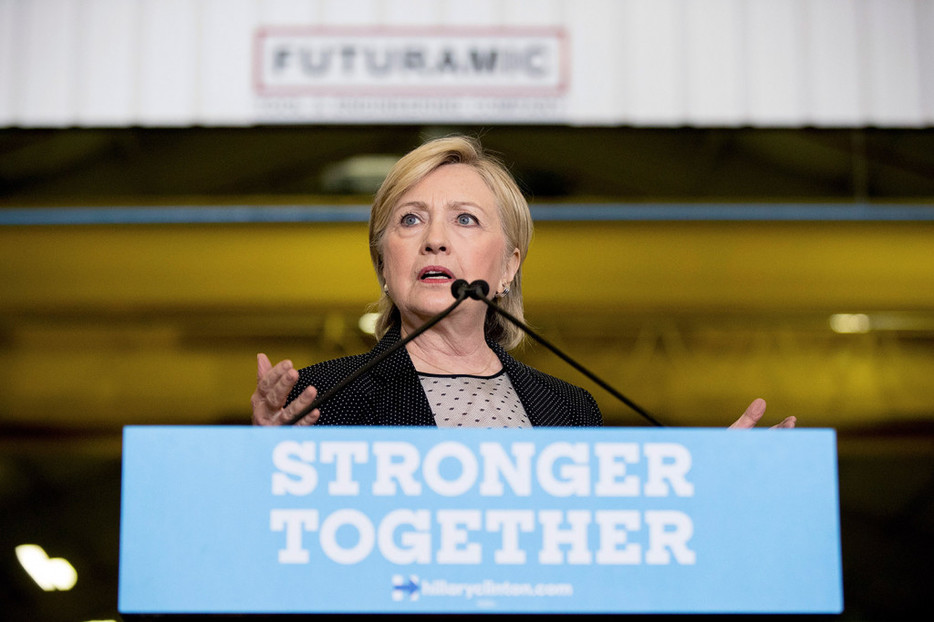
OPINION
Posted 4:00 AM Updated at 10:49 AM September 25, 2016 Our View: Hillary Clinton is our choice for president You don't have to want her to be in office to accept that Donald Trump should not be leader of the free world. BY THE EDITORIAL BOARD Democratic presiential candidate Hillary Clinton promotes her plan to invest in infrastructure in Warren, Mich., in August. Associated Press/Andrew Harnik You are going to see two candidates on stage Monday in Hempstead, New York, and one of them will be the next president of the United States. We don’t need to watch the debate to make our choice. In our view, Democrat Hillary Rodham Clinton is one of the most qualified people ever to run for the office, and she easily earns our endorsement. She has both executive branch and legislative experience as well as an expert’s depth of knowledge in both domestic and foreign policy. Electing the first woman president would open millions of doors to millions of women and girls – not just a symbolic victory, but also an actual step forward in the centuries-long struggle for equal rights. Republican Donald J. Trump is not in Clinton’s league in matters of experience, character, judgment and discipline. But while the candidates may not be close, the polls say that the race is, and that’s why it’s important for voters to take a hard look at the two people on the debate stage. You don’t have share our opinion of Clinton’s worth to agree with us that Trump’s election would be a disaster for this country. And if you come to that conclusion, you have only one choice, and that is to vote for Clinton for president. Donald Trump may be the worst major-party candidate in history. He is self-centered, reckless and mean-spirited. He is a salesman who has never sold anything other than himself, and leaves a trail of broken promises, lawsuits and bankruptcies wherever he goes. He is ignorant about government and world affairs but talks as if he knows it all. |
And he takes advantage of racial, ethnic and religious tensions to build support for himself. His careless rhetoric has brought nativists and racists out of the shadows and has spread distrust and division. Trump doesn’t have the character or the judgment to be the president of the United States, and in any normal year, his candidacy would be a joke.
But it’s not a joke this year, and that is partly Clinton’s fault. Her need for secrecy and control led to a completely avoidable email scandal, which may end up costing her the presidency. She didn’t need to rejoin the Clinton Foundation board when she left the State Department, and she should have anticipated the negative reaction that decision caused. Even her supporters at times wonder what she’s thinking. But her negative image is not entirely her fault. Over the decades she has been the center of many false scandals. She’s been accused of murdering her law partner and perpetrating a plot to have the government seize control of the internet. Some of these charges are laughable, but their sheer number creates an impression that there must be something behind them. Clinton also faces a double standard under which any misstatement or elision by her is branded a lie, while the same people laugh when her male opponent does much worse. Clinton has flaws, but they do not come close to Trump’s, which will force some voters to make a difficult choice. There will be two candidates on the stage but four on the ballot, and some Mainers will look at the minor-party candidates as a way to vote “none of the above.” Libertarian Gary Johnson is pulling 12 percent of the Maine vote according to our poll, as opposed to 8 percent nationally. Green Party nominee Jill Stein is pulling 3 percent in our Maine poll. Some of these are protest votes from people who are disgusted by the state of politics in 2016, but the voting booth is not a suggestion box. It’s either Clinton or Trump who will be standing on the Capitol steps next January. Republicans who can’t stand the idea of helping put Donald Trump in the White House have only one choice, and it’s to swallow hard and vote for Hillary Clinton. Not because they think she would be a good president but because they know Trump would be much, much worse. And Bernie Sanders supporters who say they could never bring themselves to vote for Clinton have to acknowledge that if they don’t, they will be helping elect someone antithetical to Sanders’ progressive agenda. That will be just as true if they vote for a third-party candidate or leave their ballot blank as if they fill in the oval next to Trump’s name. There will be a time for them to protest Clinton, but it begins Nov. 9, the day after Election Day, not Nov. 8. The next president will be on the stage Monday night, and Mainers should use their vote to make sure that it’s not Trump. http://www.pressherald.com/2016/09/25/our-view-hillary-clinton-is-our-choice-for-president/ |
|
Opinion Editorials
Editorials / Dallas Morning News Donald Trump is no Republican By Dallas Morning News Editorial [email protected] Staff Writer Published: 06 September 2016 04:00 AM Updated: 07 September 2016 07:00 AM What does it mean to be a Republican? For generations, the answer had been clear: A belief in individual liberty. Free markets. Strong national defense. But what does it mean to be a Republican today? With Donald Trump as the party's new standard-bearer, it's impossible to say. Even before Trump's name reached the top of the GOP presidential ticket, the party was pulled in different directions. Many Republicans held fast to the good-governing principles of the past, while a growing wing of the party yanked hard from the right to force a conscripted definition of conservatism. Inexplicably, the presidential candidate who emerged from that ideological tug of war was the one who thumbed his nose at conservative orthodoxy altogether. Trump is — or has been — at odds with nearly every GOP ideal this newspaper holds dear. Donald Trump is no Republican and certainly no conservative. Individual liberty? Trump has displayed an authoritarian streak that should horrify limited-government advocates. This impulsive, unbridled New York real estate billionaire and reality-TV star wants to deport people who were born in the U.S. and don't meet his standard for loyalty. He has proposed banning all Muslims from entering the country, even those escaping Islamist rule, and won't rule out creating a database of Muslims already living here. His open admiration of Russia's Vladimir Putin is alarming. Free markets? Economic conservatism? Ronald Reagan once said that "protectionism is destructionism." Trump, on the other hand, has called the Trans-Pacific Partnership "a rape of our country." Businesses who invest overseas, he says, should pay a hefty fine on imports. (We'll leave aside for a moment his hypocrisy in pretending that investing in hotels abroad, as he does, is somehow different from a manufacturer investing in foreign car factories.) His protectionism would likely force the U.S. into trade wars, increase the deficit and sink the U.S. economy back into a recession. Trump's idea of fiscal conservatism is reducing expenses by financing mountains of soul-crushing debt. Strong national defense? Trump pledges to make our military "so big, so powerful, so strong that nobody — absolutely nobody — is going to mess with us." But what does he want to do with that military? He says he supports killing the families of Muslim terrorists and allowing interrogation methods "a hell of a lot worse than waterboarding." And if the military balks at obeying such orders? "If I say do it, they're gonna do it," he says. His isolationist prescriptions put sound bites over sound policy: Invite the Russians into our elections. Bomb the Middle East into dust. Withdraw from NATO. It's not easy to offer a shorthand list of such tenets, since Trump flips from one side to the other, issue after issue, sometimes within a single news cycle. Regardless, his ideas are so far from Republicanism that they have spawned a new description: Trumpism. We have no interest in a Republican nominee for whom all principles are negotiable, nor in a Republican Party that is willing to trade away principle for pursuit of electoral victory. Trump doesn't reflect Republican ideals of the past; we are certain he shouldn't reflect the GOP of the future. Donald Trump is not qualified to serve as president and does not deserve your vote. http://www.dallasnews.com/opinion/editorials/20160906-donald-trump-is-no-republican.ece Trump's picture: Vernon Bryant/Staff Photographer Republican Presidential candidate Donald J. Trump speaks during the fourth day of the Republican National Convention on Thursday, July 21, 2016. (Vernon Bryant/The Dallas Morning News) |
Opinion Editorials
Editorials / Dallas Morning News We recommend Hillary Clinton for president By Dallas Morning News Editorial [email protected] Staff Writer Published: 06 September 2016 04:00 AM Updated: 07 September 2016 07:00 AM There is only one serious candidate on the presidential ballot in November. We recommend Hillary Clinton. We don't come to this decision easily. This newspaper has not recommended a Democrat for the nation's highest office since before World War II — if you're counting, that's more than 75 years and nearly 20 elections. The party's over-reliance on government and regulation to remedy the country's ills is at odds with our belief in private-sector ingenuity and innovation. Our values are more about individual liberty, free markets and a strong national defense. We've been critical of Clinton's handling of certain issues in the past. But unlike Donald Trump, Hillary Clinton has experience in actual governance, a record of service and a willingness to delve into real policy. Resume vs. resume, judgment vs. judgment, this election is no contest. In Clinton's eight years in the U.S. Senate, she displayed reach and influence in foreign affairs. Though conservatives like to paint her as nakedly partisan, on Capitol Hill she gained respect from Republicans for working across the aisle: Two-thirds of her bills had GOP co-sponsors and included common ground with some of Congress' most conservative lawmakers. As President Barack Obama's first secretary of state, she helped make tough calls on the Middle East and the complex struggle against radical Islamic terrorism. It's no accident that hundreds of Republican foreign policy hands back Clinton. She also has the support of dozens of top advisers from previous Republican administrations, including Henry Paulson, John Negroponte, Richard Armitage and Brent Scowcroft. Also on this list is Jim Glassman, the founding executive director of the George W. Bush Institute in Dallas. Clinton has remained dogged by questions about her honesty, her willingness to shade the truth. Her use of a private email server while secretary of state is a clear example of poor judgment. She should take additional steps to divorce allegations of influence peddling from the Clinton Foundation. And she must be more forthright with the public by holding news conferences, as opposed to relying on a shield of carefully scripted appearances and speeches. Those are real shortcomings. But they pale in comparison to the litany of evils some opponents accuse her of. Treason? Murder? Her being cleared of crimes by investigation after investigation has no effect on these political hyenas; they refuse to see anything but conspiracies and cover-ups. We reject the politics of personal destruction. Clinton has made mistakes and displayed bad judgment, but her errors are plainly in a different universe than her opponent’s. Trump's values are hostile to conservatism. He plays on fear — exploiting base instincts of xenophobia, racism and misogyny — to bring out the worst in all of us, rather than the best. His serial shifts on fundamental issues reveal an astounding absence of preparedness. And his improvisational insults and midnight tweets exhibit a dangerous lack of judgment and impulse control. After nearly four decades in the public spotlight, 25 of them on the national stage, Clinton is a known quantity. For all her warts, she is the candidate more likely to keep our nation safe, to protect American ideals and to work across the aisle to uphold the vital domestic institutions that rely on a competent, experienced president. Hillary Clinton has spent years in the trenches doing the hard work needed to prepare herself to lead our nation. In this race, at this time, she deserves your vote. http://beta.dallasnews.com/opinion/editorials/2016/09/07/recommend-hillary-clinton-us-president?_ga=1.189196717.762458885.1473254333 https://www.yahoo.com/news/dallas-morning-news-trump-not-republican-editorial-145210750.html |
Starbucks CEO Howard Schultz Endorses Hillary Clinton
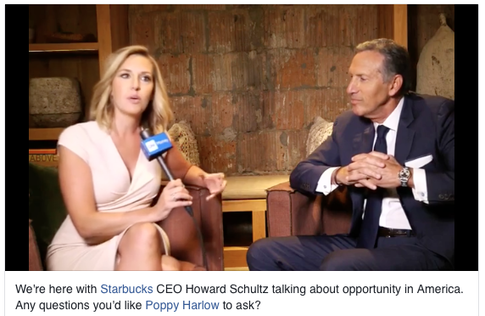
American Opportunity
Starbucks CEO Howard Schultz endorses Hillary Clinton
by Heather Long @byHeatherLong
September 7, 2016: 9:34 AM ET
Howard Schultz, the CEO of Starbucks, endorsed Hillary Clinton for president on Wednesday.
Schultz is one of the country's most politically outspoken chief executives, but until now he had not taken sides in the 2016 race between Democrat Clinton and Republican nominee Donald Trump.
"I think it's obvious Hillary Clinton needs to be the next president," Schultz told Poppy Harlow at the first-ever CNNMoney American Opportunity conference in New York. Clinton has the ideal "life experience" and "professional experience" to be president, he said.
Schultz, who calls himself a "life-long Democrat," endorsed Barack Obama for president in 2008 and again in 2012. He has donated only to Democrats over the years, according to the Center for Responsive Politics, with the exception of one donation to Republican Senator John McCain in the late 1990s.
The Starbucks (SBUX) CEO also opened the door for his own possible run for the White House one day. He has repeatedly called the U.S. political process a "circus" and “bombastic."
"I'm still a young man," he said Wednesday. At age 63, Schultz is younger than both Clinton and Trump, but he batted away any notion that he's gunning to run soon.
"I would never say never, but this is not the right time," he said.
http://money.cnn.com/2016/09/07/news/economy/howard-schultz-hillary-clinton/index.html?sr=twpol090816howard-schultz-hillary-clinton/0402AMStoryLink&linkId=28499784
Donald Trump's Rudeness Towards Other People
http://www.nbcnews.com/politics/2016-election/who-was-donald-trump-apologizing-here-are-23-possibilities-n634341
Trans Pacific Partnership and American Politics
The Trans-Pacific Partnership (TPP) is still not in force because it is an agreement signed but yet to be fully ratified. It needs ratification by all 12 signatory countries’ parliaments, including the US Congress.
TPP’s over 2,000 page-long documents (http://www.international.gc.ca/trade-agreements-accords-commerciaux/agr-acc/tpp-ptp/text-texte/toc-tdm.aspx?lang=eng ) must be read and scrutinized by senators and congressmen before voting during the next administration. At this point I don’t see how any presidential candidate, let alone the voters, can have a committed idea on the TPP unless they have gone through the TPP documents.
For the Republican candidate, Mr.Donald Trump, to reject the TPP agreement all together he must read the TPP documents first in order to understand its implication affecting the USA. It must be good for the USA or the Obama administration wouldn’t have signed it in the first place.
As for the Democratic presidential nominee, Mrs.Hillary Clinton, she was part of the early TPP negotiation process when she was Secretary of State. Since then Secretary of State John Kerry, and President Barack Obama have been directly responsible for the final negotiation leading to the signing in Atlanta on October 5, 2015.
For a brief history of US free trade deals, voters should read "Broken Promise", a paper written by Elizabeth Warren and her staff (http://www.warren.senate.gov/files/documents/BrokenPromises.pdf). In simple format, it clearly explains the failures of previous US governments, Democratic and Republican, in dealing with various free trade agreements, from the North American Free Trade Agreement to the Trans Pacific Partnership.
In the meantimes, the Trans Pacific Partnership still awaits ratifications by all member countries for it to enter into force. It is not up to the President of the United States himself alone to make or break the commitment. It needs congressional approval, whenever that may be. It is up to the two political parties to fight for the majority in both houses so that they can control the outcome of the congressional votes for or against the TPP.
Renegotiation for the TPP is, in principle, not possible because the US has already signed it. Not only that, the US has been the leading proponent of the TPP all along. It will be very embarrassing, indeed, if the US suddenly found a reason to reject its own idea.
For TPP to enter into force, it must be ratified by at least 6 signatories by 4 February, 2018.
And those 6 signatories together must have a GDP of more than 85% of the GDP of all 12 signatories.
Judging from the direction US campaign politics is heading the Trans Pacific Partnership will not succeed unless the next US president has the courage to tell the public the truth that TPP is in fact a good deal for America.
All talks about rejecting the TPP by both presidential candidates and their respective supporters are just superficial election campaign rhetorics. No-one can explain this complex subject to voters in 140 characters.
Mr.Donald Trump chose a simple way out by saying “no”. It’s easy for him to say no to something he “doesn’t have a clue” about. He doesn’t a clue, period! He has no history of being involved this or in any other regional trade negotiation.
Mrs. Hillary Clinton reluctantly said “it is not my kind of deal”, leaving room for re-negotiation. It’s hard for her to reject the TPP outright because she was for many years a part of the negotiation process. And she knows that it is a very good deal for the US.
Come to think of it, it is odd, and I mean odd, that we in Thailand feel that the US enjoys unfair advantage over small countries in the TPP. That was why Thailand decided not to join the trade pact, in spite of strong persuasion from the US. To no avail, Secretary of State Hillary Clinton came to Thailand to convince my Prime Minister in 2012.
American voters really have much to read and lots of homework to do before November, 2016.
Thaivision
Pak Chong, Thailand
29 July 2016
References:
US State Department information on TPP
http://www.state.gov/e/eb/tpp/bta/fta/tpp/index.htm
TPP Documents / Government of Canada
http://www.international.gc.ca/trade-agreements-accords-commerciaux/agr-acc/tpp-ptp/text-texte/toc-tdm.aspx?lang=eng
Elizabeth Warren’s Paper, “Broken Promises”
http://www.warren.senate.gov/files/documents/BrokenPromises.pdf
General information on TPP
https://en.wikipedia.org/wiki/Trans-Pacific_Partnership
Hillary for America
https://www.hillaryclinton.com
Donald J. Trump For President
https://www.donaldjtrump.com
The Trans-Pacific Partnership (TPP) is still not in force because it is an agreement signed but yet to be fully ratified. It needs ratification by all 12 signatory countries’ parliaments, including the US Congress.
TPP’s over 2,000 page-long documents (http://www.international.gc.ca/trade-agreements-accords-commerciaux/agr-acc/tpp-ptp/text-texte/toc-tdm.aspx?lang=eng ) must be read and scrutinized by senators and congressmen before voting during the next administration. At this point I don’t see how any presidential candidate, let alone the voters, can have a committed idea on the TPP unless they have gone through the TPP documents.
For the Republican candidate, Mr.Donald Trump, to reject the TPP agreement all together he must read the TPP documents first in order to understand its implication affecting the USA. It must be good for the USA or the Obama administration wouldn’t have signed it in the first place.
As for the Democratic presidential nominee, Mrs.Hillary Clinton, she was part of the early TPP negotiation process when she was Secretary of State. Since then Secretary of State John Kerry, and President Barack Obama have been directly responsible for the final negotiation leading to the signing in Atlanta on October 5, 2015.
For a brief history of US free trade deals, voters should read "Broken Promise", a paper written by Elizabeth Warren and her staff (http://www.warren.senate.gov/files/documents/BrokenPromises.pdf). In simple format, it clearly explains the failures of previous US governments, Democratic and Republican, in dealing with various free trade agreements, from the North American Free Trade Agreement to the Trans Pacific Partnership.
In the meantimes, the Trans Pacific Partnership still awaits ratifications by all member countries for it to enter into force. It is not up to the President of the United States himself alone to make or break the commitment. It needs congressional approval, whenever that may be. It is up to the two political parties to fight for the majority in both houses so that they can control the outcome of the congressional votes for or against the TPP.
Renegotiation for the TPP is, in principle, not possible because the US has already signed it. Not only that, the US has been the leading proponent of the TPP all along. It will be very embarrassing, indeed, if the US suddenly found a reason to reject its own idea.
For TPP to enter into force, it must be ratified by at least 6 signatories by 4 February, 2018.
And those 6 signatories together must have a GDP of more than 85% of the GDP of all 12 signatories.
Judging from the direction US campaign politics is heading the Trans Pacific Partnership will not succeed unless the next US president has the courage to tell the public the truth that TPP is in fact a good deal for America.
All talks about rejecting the TPP by both presidential candidates and their respective supporters are just superficial election campaign rhetorics. No-one can explain this complex subject to voters in 140 characters.
Mr.Donald Trump chose a simple way out by saying “no”. It’s easy for him to say no to something he “doesn’t have a clue” about. He doesn’t a clue, period! He has no history of being involved this or in any other regional trade negotiation.
Mrs. Hillary Clinton reluctantly said “it is not my kind of deal”, leaving room for re-negotiation. It’s hard for her to reject the TPP outright because she was for many years a part of the negotiation process. And she knows that it is a very good deal for the US.
Come to think of it, it is odd, and I mean odd, that we in Thailand feel that the US enjoys unfair advantage over small countries in the TPP. That was why Thailand decided not to join the trade pact, in spite of strong persuasion from the US. To no avail, Secretary of State Hillary Clinton came to Thailand to convince my Prime Minister in 2012.
American voters really have much to read and lots of homework to do before November, 2016.
Thaivision
Pak Chong, Thailand
29 July 2016
References:
US State Department information on TPP
http://www.state.gov/e/eb/tpp/bta/fta/tpp/index.htm
TPP Documents / Government of Canada
http://www.international.gc.ca/trade-agreements-accords-commerciaux/agr-acc/tpp-ptp/text-texte/toc-tdm.aspx?lang=eng
Elizabeth Warren’s Paper, “Broken Promises”
http://www.warren.senate.gov/files/documents/BrokenPromises.pdf
General information on TPP
https://en.wikipedia.org/wiki/Trans-Pacific_Partnership
Hillary for America
https://www.hillaryclinton.com
Donald J. Trump For President
https://www.donaldjtrump.com
http://www.huffingtonpost.com/entry/joe-heller-trump-clinton-cartoon_us_579b93d4e4b0693164c120e1 Picture credit: The Huffington Post
French President Francois Hollande: Trump's 'Excesses Make You Want To Retch'
ประธานาธิบดีฝรั่งเศส ฟัง Trump พูดแล้ว ‘อยากอ๊วก’
|
French President Francois Hollande POOL / Reuters
ประธานาธิบดีฝรั่งเศส ฟัง Trump พูดแล้ว ‘อยากอ๊วก’ French President Francois Hollande: Trump's 'Excesses Make You Want To Retch' ข่าว NBC/AFP/2 สิงหาคม 2016 นาย ฟรังซัว โอลอง, ประธานาธิบดีฝรั่งเศส, ให้สัมภาษณ์คณะผู้สื่อข่าว ที่กรุงปาสรีส เมื่อวันอังคารที่ 2 สิงหาคม 2016 ตำหนินาย Donald Trump อย่างร้อนแรง โดยกล่าวตอนหนึ่งว่า: “Donald Trump พูดจาก้าวร้าวรุนแรง ฟังแล้วอยากอ๊วก” (“His excesses make you want to retch”) “นาย Trump พูดให้ร้ายทหาร ทำร้ายความทรงจำเกี่ยวกับนายทหาร” เวลาที่พูดพาดพิงโจมตีนาย Khizr และ นาง Ghazala Khan ผู้เป็นบิดาและมารดาของทหารอเมริกันที่เสียชีวิตที่อิรัก ท่านกล่าวต่อไปว่าคำพูดของ Trump เป็นการใช้วาจาที่ทำลายความรู้สึกอย่างเจ็บปวดและเป็นเรื่องน่าอับอายที่เขาใช้วาจาเช่นนั้น พร้อมกับชี้ให้เห็นความสำคัญของการเลือกตั้งในสหรัฐที่มีผลต่อโลกว่า: “การเลือกตั้งประธานาธิบดีสหรัฐที่กำลังจะมาถึงนี้ถือเป็นการเลือกตั้งสำหรับคนทั้งโลกด้วย” “การเลือกตั้งครั้งนี้มีประชาธิปไตยเป็นเดิมพัน, ยิ่งดูไปก็ยิ่งเห็นว่าคนอเมริกันมีทีท่าว่าจะชอบลัทธิอำนาจนิยมมากขึ้นเรื่อยๆ ถ้าเกิดว่าคนอเมริกันเลือก Donald Trump ก็จะเกิดผลกระทบตามมา เพราะการเลือกตั้งในสหรัฐฯถือเป็นการเลือกตั้งระดับโลก” อันจะส่งผลให้การเมืองโลกแกว่งไกวหวั่นไหว เพราะ “การรณรงค์หาเสียงในสหรัฐฯออกมาในรูปแบบแนวคิดทางไหน ก็จะถูกนำมาใช้ในการรณรงค์หาเสียงในการเลือกตั้งที่ฝรั่งเศสด้วย อะไรที่เคยคิดแต่แรกเริ่มว่า รัฐบาลที่จะนำโดย Trump นั้น ไม่มีทางเป็นไปได้ มาตอนนี้ก็กลายเป็นว่าอาจเป็นไปได้จริงๆด้วย” ประธานาธิบดีฝรั่งเศสกล่าวตอนท้ายว่า: “พวกนักการเมืองทั้งหลายนั้น ถ้าจะให้เป็นที่เคารพของผู้คน ก็ควรต้องทำตัวให้น่าเคารพเสียก่อน” สรุปข่าว จากต้นฉบับของสำนักข่าว AFP รายงานต่อโดยสำนักข่าว NBC ปากช่อง, นครราชสีมา 3 สิงหาคม 2016 |
ต้นฉบับข่าว
NBC NEWS /AFP AUG 2 2016, 7:18 PM ET French President Francois Hollande: Trump's 'Excesses Make You Want To Retch' by ELI PANKEN French President Francois Hollande on Tuesday reprimanded the "excesses" of Republican presidential candidate Donald Trump, calling his statements "sickening." "His excesses make you want to retch, even in the United States, especially when — as was Donald Trump's case — he speaks ill of a soldier, of the memory of a soldier," Hollande told journalists at a gathering in Paris, according to the AFP. Hollande's comments follow Trump's attacks on Khizr and Ghazala Khan, the parents of an American soldier killed in Iraq. The French president called Trump's comments "hurtful and humiliating" and noted the importance of the upcoming U.S. presidential election for the entire world. "Democracy is also as stake, as we see more and more people tempted by authoritarianism," Hollande said. "Should the American people choose Trump, there will be consequences because a U.S. election is a global election." Hollande expressed his concern for how a Trump presidency could swing international politics. "The U.S. campaign provides themes that will then come into the French campaign," Hollande said, before adding that what was previously an "unthinkable" Trump administration has now become "foreseeable." On politicians in general, Hollande said "they should be respected when they are respectable.” อ้างอิง: http://www.nbcnews.com/news/world/french-president-francois-hollande-trump-s-excesses-make-you-want-n621871 |
|
BERNIE SANDERS IS NEITHER A SOCIALIST
NOR A REVOLUTIONARY. Bernie Sanders is not really a socialist and he probably doesn't know it. The closest he could be is a mild form of social democrat. The article by the Economist explains with academic reference the real meaning of socialism as expounded by Karl Marx in 1848. For Bernie Sanders to ignite a "socialist revolution" in America, as he has been telling his followers during the presidential campaign, he will have to incite American workers, laborers and proletarians to rise up and take control of the means of production, not just a simple minimum wage increase, free college education, universal healthcare, and badmouthing Wall Street capitalists and Washington "establishment". Nationalization of financial institutions and big industries will be a top priority for the the socialist revolution to succeed, an important first step for the future president Bernie Sanders, a self-proclaimed socialist who obviously ignores the Communist Manifesto and Karl Marx's dissertation. Sanders' self-proclaimed brand of a socialism is theoretically wrong. What he has been proposing is a combination of some populist programs and elements of European social democracy. It's an attempt at social reform not a revolution. Being a social reformer is good enough for him to win many votes from politically un-informed population. But he needs to work out his plan more thoroughly. I am not really serious about Bernie Sanders being a socialist revolutionary as he claims to be since the early days of his political campaign. I just want the American media to work harder to educate voters of the present generation who do not care to dig deeper underneath the fancy words of politicians. American media have nothing to loose but their editors' chains, they have the whole public to win. The proletarian voters of America have nothing to lose but their chains. They have America to win. Working Media of America, Unite! Thaivision Thailand 5 February 2016 Reference: http://www.economist.com/blogs/democracyinamerica/2016/02/bernie-manifesto |
Bernie Sanders
ไม่ใช่นักปฏิวัติสังคมนิยม ความสับสนของเบอร์นี่ แซนเดอร์ เรื่องสังคมนิยม, การปฏิวัติสังคมนิยม, สังคมนิยมประชาธิปไตย, ประชาธิปไตยสังคม, ประชานิยม และ รัฐสวัสดิการ Bernie Sanders, สมาชิกวุฒิสภารัฐ Vermont ลงสมัครแข่งขัน คะแนนใกล้เคียงกับ Hillary Clinton, เพื่อชิงตำแหน่งตัวแทนพรรค Democrat ไปรับเลือกตั้งเป็นประธานาธิบดีสหรัฐอเมริกา ปลายปี 2016 นี้ Sanders ประกาศตัวเป็นนักสังคมนิยม และบอกกับผู้สนับสนุนว่าเขาเป็นนักปฏิวัติสังคมนิยม และยืนยันกับกับ Anderson Cooper พิธีกร CNN เมื่อค่ำวันที่ 3 กุมภาพันธ์ระหว่างการสัมภาษณ์แบบประชุมชาวบ้าน (Town Hall Meeting) ว่า เขายืนยันใช้คำว่า "Revolution" (ปฏิวัติฉับพลัน) ซึ่งเหมาะสมกว่าคำว่า "Evolution" (วิวัฒนาการเปลี่ยนแปลงอย่างช้าๆ) บทความจากนิตยสาร The Economist เรื่อง How Much of a Socialist is Sanders อธิบายความหมายที่แท้จริงของคำว่า "สังคมนิยม" และ "ปฏวัติสังคมนิยม" ซึ่ง Bernie Sanders มิได้มีความคิดอะไรใกล้เคียงความเป็นสังคมนิยมเลย ยิ่งจะด้วยการปฏิวัติแบบฉับพลันด้วยแล้ว Sanders ไม่มีความคิดอะไรใกล้เคียงหลักการปฏิวัติชนชั้นกรรมาชีพของ Karl Marx เลย ถ้าจะปฏิวัติสังคมนิยมในอเมริกา Bernie Sanders จะต้องปลุกพลังชนชั้นกรรมาชีพ ผู้ใช้แรงงาน ลูกจ้าง ชาวไร่ชาวนาผู้ยากจนต่ำต้อย หากจะรวมชนชั้นกลางด้วยก็ได้ แต่จะยากมากให้ลุกฮือขึ้นยึดอำนาจและเครื่องมือการผลิตจากนายทุน โรงงานอุตสาหกรรม ราชาที่ดิน และจะต้องยึดกิจการธนาคาร สถาบันการเงิน และอุตสาห- กรรมสำคัญๆมาเป็นของรัฐ แต่เท่าที่ Bernie Sanders หาเสียง ก็เพียงบอกว่าจะต่อต้านนักธุรกิจลงทุนในตลาดหุ้น Wall Street, จะให้บริการประกันสุขภาพกับประชาชนทุกคน, ให้เรียนระดับมหาวิทยาลัยฟรีทั่วประเทศ เฉพาะที่เป็นมหาวิทยาลัยของรัฐ, ขึ้นค่าแรงงานขั้นต่ำเป็น $15/ชม. แนวคิดย่อยๆเล็กๆแบบนี้ถือเป็นเพียงนโยบาย "ประชาธิปไตยแบบใส่ใจสังคม" ที่ศัพท์รัฐศาสตร์เรียกว่า "Social Democrat" ซึ่งในภาคปฏิบัติก็มีที่ประสพความสำเร็จในกลุ่มประเทศ Scandinavia ซึ่งถือเป็นรูปแบบรัฐสวัสดิการแบบหนึ่งที่ประชาชนทำงานหนัก เสียภาษีหนักทุกคน และได้รับสวัสดิการที่ดีจากรัฐ ใน Germany ก็มีพรรค SDU เป็นพรรคเชิง Social Democrat หรือ "สังคมประชาธิปไตย" แต่ไม่ใช่ "สังคมนิยม" ที่แท้จริง แม้นักรัฐศาสตร์ไทยบางตำราอาจแปลตามความสะดวกว่า "สังคมนิยมประชาธิปไตย" ก็ตาม ในอินเดีย เคยมีความพยายามเป็นสังคมนิยมประชาธิปไตยแบบที่เข้มข้นกว่า Social Democrat ในสมัยรัฐบาลนายกรัฐมนตรีอินทิรา คานธี (1966-1977) ซึ่งเรียกว่า "Democratic Socialism" มีการยึดธานาคารเอกชนมาเป็นของรัฐ และรัฐริเริ่มอุตสาหกรรมหนักเป็นของรัฐเองในบางกิจการ แต่ไม่ทั้งหมด รัฐมนตรีคลังชื่อ Morarji Desai สานต่อนโยบายนี้ภายหลังที่ตนเองขึ้นสู่ตำแหน่งนายกรัฐมนตรีในเวลาต่อมา แต่ไม่ประสพความสำเร็จ อินเดียในยุคหลังพรรคกรองเกรสของนางอินทิรา คานธี ตกต่ำ อำนาจการเมืองเปลี่ยนถ่ายไปเป็นของพรรคฮินดูขวาจัด ชื่อ Bharatiya Janata Party (BJP) Democratic Socialism ต้องปรับตัวให้เข้ากับโลกทุนนิยมปัจจุบัน พวกสังคมนิยมสุดขอบเช่นคอมมิวนิสต์จีน, เวียดนาม, และ ลาว ก็ผันตัวเองเป็นทุนนิยมมากบ้างน้อยบ้างอย่างไม่กล้าประกาศละทิ้งอุดมการณ์สังคมนิยมเดิมอย่างเป็นทางการ เหลือคิวบา กับ เกาหลีเหนือ ที่ยังเป็นรัฐสังคมนิยมในรูปแบบอำนาจนิยมของผู้นำอยู่เช่นเดิม แต่ก็มิใช่รัฐที่เป็นสังคมนิยมแบบ Marxism ที่แท้จริง ดังนั้น Bernie Sanders จึงเป็นนักการเมืองผู้หาเสียงกับประชาชนอย่างฉาบฉวยด้วยถ้อยคำหรูหราแต่ไร้ความหมาย ส่วนประชาชนและสื่อมวลชนอเมริกันก็ผิวเผินฉาบฉวยเช่นกัน ไม่มีใครตั้งคำถามจริงจังเรื่อง "Bernie's Socialism in America" โดยเฉพาะ "Socialist Revolution in America" ปล่อยให้ประชาชนผู้มีสิทธิออกเสียงเลือกตั้งไหลเลื่อนไปตามกระแสแห่งความไม่รู้ หลงทางไปกับนักการเมืองฝีปากดี แต่ขาดการศึกษาเรื่องปรัชญาเศรษฐกิจการเมืองอย่างแท้จริง การศึกษาเรื่องปรัชญาการเมืองในสังคมประชาธิปไตยในอเมริกากำลังถดถอยด้อยคุณภาพลง หากปล่อยไปโดยสังคมไม่ช่วยกับปฏิรูปการศึกษาทั้งในหมู่ประชาชนและสื่อสารมวลชนแล้วอเมริกาก็อาจถึงจุดเสื่อมที่จะไม่สามารถเป็นมาตรฐานวัดความเป็นประชาธิปไตยโลกได้เท่ากับอดีตที่ผ่านมา รอดูผลการเลือกตั้งปลายปีก่อนจะเห็นอนาคตประชาธิปไตยในอเมริกา ยังไม่สายเกินแก้ หากสื่อมวลชนอเมริกันตื่นตัว รู้เท่าทันนักการเมือง Thaivision 5 กุมภาพันธ์ 2559 อ้างอิง: http://www.economist.com/blogs/democracyinamerica/2016/02/bernie-manifesto |
In the photo, Afghan students listen to an instructor from the International Foundation For Election Systems who is teaching them about the election process on October 4, 2004 in Kabul. Photo credit: Paula Bronstein/Getty Images
|
Is the United States Giving Up on Supporting Democracy Abroad? The skeptics of democracy promotion are having a field day. But under the radar, much of the important work continues. BY THOMAS CAROTHERS Thomas Carothers, vice president for studies at the Carnegie Endowment for International Peace, is a leading authority on international democracy support. SEPTEMBER 8, 2016 - 10:53 AM When the goal of fostering and strengthening democracy abroad became a significant element of U.S. foreign policy in the 1980s, an informal network of enthusiastic democracy practitioners, activists, and scholars emerged within the foreign policy community. Over time, their numbers expanded to encompass diplomats, aid practitioners, members of Congress, and others. While still a minority within the larger circle of U.S. policymakers, this community has become a substantial and persistent voice urging that the promotion of democracy assume a central role in America’s global engagement and criticizing U.S. actions abroad that compromise democratic values. In the 1990s, as democracy advanced around the world, democracy promotion got a hearing at the high table of U.S. foreign policy. Many mainstream policymakers embraced the idea of democratic enlargement as a core policy goal. In practice, of course, their lofty declarations of a U.S. commitment to democracy promotion outstripped the reality. Although Washington no longer needed to support dictators for the sake of anti-communism, various security and economic interests — from trade with China to the Arab-Israeli peace process — kept the United States in bed with quite a few autocratic strongmen. Moreover, behind their pro-democratic words, most mainstream policymakers did not share the faith of the democracy community in the ability of the United States to shape the political direction of other countries. Trending Articles After 9/11, the cause of democracy rose once again on the policy agenda. George W. Bush’s “war on terror” incorporated the hope that helping foster political inclusion in the Middle East and elsewhere would help undercut the roots of Islamist radicalism. But again, the reality proved more complex. Serious contradictions emerged between the president’s high-octane “freedom agenda” rhetoric and his administration’s policy practice — particularly as U.S. military and intelligence efforts on counterterrorism entailed closer ties with non-democratic governments from Pakistan to Saudi Arabia. Yet, as in the 1990s, U.S. democracy enthusiasts felt that democracy was at least in the United States’ central strategic mix. This is no longer the case. Serious pessimism about democracy’s global fortunes as well as skepticism about the value and wisdom of democracy promotion have gripped Washington. Democracy is no longer among the main areas of concern in U.S. foreign policy, as evinced by the United States’ approaches to major geopolitical rivals like Russia and China and its engagement in the Middle East. Yet democracy enthusiasts maintain a fundamentally different, more optimistic view of the state of democracy in the world and remain convinced that supporting it should be a central priority. In short, what were once two only partly divergent perspectives have become two almost entirely separate narratives. Furthermore, the position that the United States should actively promote democracy abroad has lost ground, becoming quite clearly a minority view. The upcoming U.S. presidential election is unlikely to change this situation. Yet democracy promotion still exists, albeit quietly, in many areas of U.S. policy, and many of its adherents remain in the bureaucracy. By working to maintain and slowly expand their work out of the limelight, democracy promoters can ensure that the new pessimism does not extinguish decades of valuable gains in knowledge and capacity about how best to support democracy around the world. The new pessimism starts from a bleak assessment of the state of democracy in the developing and post-communist countries. The heady democratic expansion of the 1990s has been replaced by democratic stagnation or even recession. As measured in the Freedom House index, the number of democracies in the world is no greater today than it was ten years ago. Discouraging cases of backsliding or fragmentation are multiplying, whether it be military rule in Thailand, the rise of antidemocratic populism in Hungary and Poland, polarization and near chaos in Venezuela, the closing of political space in Turkey, civil war in Yemen, or extended presidential rule in Burundi. Meanwhile, various authoritarian regimes are exhibiting a new self-confidence on the international stage, adopting more assertive security postures, and expanding their support for other non-democratic forces. A hallmark view of the early post-Cold War years — that democracy has no serious ideological rival — has been replaced by the worry that the “China model” and other authoritarian exemplars are winning hearts and minds in many places. One might expect this view to spur the U.S. to do more on democracy promotion and try to reverse the trend. But instead, it is hardening the skepticism about the United States’ capacity to promote democracy abroad that many policymakers have felt all along. The punishing experiences of Iraq and Afghanistan contributed greatly to this trend. Both interventions appear to be glaring examples of why the United States should abandon what John Mearsheimer and Stephen Walt have recently called “the democracy delusion.” In his new book, Mission Failure, Michael Mandelbaum portrays these two cases, along with the United States’ attempts to support democratic change in Haiti, Bosnia, Russia, and other places, as a litany of failures driven by the United States’ misguided belief in its ability to transform the politics of other countries. The disastrous outcomes of most of the Arab uprisings of 2011-2012 also resounded loudly in U.S. foreign policy circles, serving as a further warning about the apparent folly of democracy promotion. Pessimists conclude from the violent or ambiguous outcomes in Libya, Egypt, Syria, Yemen, and elsewhere that the United States had no real capacity to foster positive change in the Arab world, and that in fact it made things worse by trying. This pessimistic view of democracy promotion not only questions whether the United States has the capacity to promote democratic change but also whether it is in its interests to do so. Pessimists insist that the many urgent security challenges facing the United States, from radical Islamist terrorism to the rise of China, overshadow and often conflict with the democracy promotion endeavor. The United States’ current counterterrorism policy, in particular, continues to be conducted in a way that puts it at direct odds with support for democracy, particularly when it entails direct cooperation between U.S. security agencies and foreign counterparts that are known for repressive practices. The United States regularly finds itself downplaying the topics of democracy and human rights in conversations with governments that are viewed as useful allies in the fight against terrorism, not just in the Middle East (such as Jordan), but also in place like Ethiopia and Malaysia. The troubled state of democracy within the United States itself completes the pessimistic picture. Traditionally, mainstream U.S. policymakers and analysts have assumed the United States’ political superiority relative to developing countries. But today, many of them frequently highlight America’s myriad domestic woes. They argue that the U.S. must concentrate on getting its own house in order, or that America’s domestic troubles undercut the credibility of U.S. democracy promotion. In a July interview with the New York Times, Donald Trump said, “When the world sees how bad the United States is and we start talking about civil liberties, I don’t think we are a very good messenger.” Then there’s the opposing view. Democracy promoters are certainly aware of the above-mentioned challenges. Yet their optimism runs deep, and they reject the pessimists’ main conclusions. To start with, they acknowledge the global stagnation of democracy, but view the situation as, at worst, a mixed picture. They emphasize that, alongside the cases of backsliding, a good number of positive democratic developments have taken place. Bad news on democracy attracts headlines, they note, while good news tends not to. Making the case for a more positive view on democracy and democracy promotion in Foreign Affairs earlier this year, for example, Larry Diamond cites Burma, Nigeria, and Sri Lanka as encouraging cases. Moreover, the optimists insist on a longer-term perspective, arguing that while the number of democracies has not increased in the past ten years, it remains close to its historic peak, and that polling in most countries reveals a strong preference for democracy over any other form of government. Today’s democratic stagnation, they contend, should be viewed — at worst — as a pause in a multigeneratonal trend of democratic growth. They argue, for example, that it’s much too early to declare the Arab Spring a failure. Democratic change often occurs in fits and starts over an extended period. In their view, the key fact is that many Arabs have recognized the need for fundamental political change and have been willing to push for it, even when it has meant paying with their lives. |
They also differ with the pessimists regarding the durability of the authoritarian surge. They see the greater assertiveness of authoritarians — such as Russia’s actions in Ukraine and China’s in the South China Sea — not as evidence of the authoritarian model’s success, but rather as a sign of its weakness. In this view, Russian and Chinese leaders are fearful of their citizens’ reactions to economic slowdowns and bad governance, and are playing the nationalist card of external belligerence as a way to shore up their legitimacy. They regard the growing “autocracy promotion” on the part of some authoritarian governments as a call to arms against democracy support. In their view, it should prompt a vigorous response akin to President Ronald Reagan’s embrace of democracy promotion in the early 1980s in reaction to the Soviet Union’s efforts to win the global “war of ideas.”
When it comes to the United States’ capabilities, democracy optimists agree that Iraq and Afghanistan have been disastrous experiences. But they see them as exceptional cases from which general rules about democracy building should not be drawn, beyond the proposition that military-led regime change is rarely a good method of promoting democracy. These, the democracy promoters say, were not the cases they asked for. Rather, they were military interventions driven by security imperatives, with democracy building becoming a post-invasion afterthought. Nor do democracy promoters see the aftermath of the Arab Spring as proof positive of the limits of the United States’ capabilities in democracy promotion. In general, they don’t believe that the U.S. government made a very significant effort to affect the outcome of these uprisings. They argue, for example, that the disappointing outcomes in Egypt and Bahrain can be explained more by the United States’ failure to make use of its leverage to promote democratic change than by any failure of its (essentially insignificant) democracy promotion efforts. The optimists dismiss the broader argument that U.S. democracy promotion policy since the early 1990s has been nothing more than a sorry string of failed efforts, arguing that this view requires cherry picking a handful of the hardest cases and willfully ignoring dozens of less prominent, more typical examples of democracy support — ones in which the United States and other Western democracies have been able to make clear and meaningful contributions to democratic progress. Such positive cases include Burkina Faso, Chile, Colombia, Indonesia, Mongolia, Burma, Senegal, Slovakia, and Tunisia. Democracy promoters also take strong exception to the view that counterterrorism need necessarily trump commitment to democracy. They acknowledge that compromises with some helpful authoritarians are an inevitable part of U.S. counterterrorism policy. But they insist that encouraging political pluralism in Muslim-majority countries must be a foundation stone of the United States’ long-term approach to countering violent extremism. Finally, democracy promoters recognize the mounting problems with democracy in the United States and feel their effects in their work. But they disagree that these shortcomings disqualify the United States from fostering democracy abroad. In their opinion, such a view rests on an out-of-date notion of democracy promotion as the exportation of the U.S. model, mixed in with one-sided “lecturing” of foreigners by Americans. They argue that, although such an impulse may have been present in the earliest democracy promotion efforts, it has more recently been replaced by a more sophisticated, interactive conception of democracy support in which the United States can help make available comparative experiences from multiple sources to officials and activists struggling to achieve democracy in their own countries. Some democracy promoters argue further that if Americans who work in democracy promotion openly acknowledge the United States’ own political defects, this can in fact open rather than close doors to U.S. democracy support by helping deflate perceptions of American arrogance. In short, the gulf between the democracy community and the pessimistic mainstream view of democracy promotion is vast. In Washington, the drumbeat of negative events around the world relating to democracy has become almost deafening. President Obama and his administration have not fully embraced the realist perspective that Mearsheimer, Walt, Mandelbaum, and some others advocate, but they are not far from it. There is no transformative ambition evident in any of the main lines of U.S. foreign policy, whether toward Russia, China, or the Middle East. Instead, realist engagement with rivals dominates. Obama’s early declarations of broad pro-democratic aspirations, such as those he laid out in Cairo in 2009, are very much a thing of the past. The old U.S. habit of making do with authoritarian allies for the stake of stability or security is making itself felt once again — not only in U.S. relations with the Arab world, but in Africa (such as with Rwanda and Ethiopia), Asia (such as with Vietnam), and Turkey. Yet democracy promotion is not off the table. In Ukraine and Tunisia, the United States has stepped up support for democratic consolidation. In numerous other transitional countries of secondary policy import, U.S. diplomats sometimes nudge their official counterparts in favor of democratic outcomes. President Obama has responded to the global trend of closing space for civil society with the “Stand with Civil Society” call to action. The administration strongly backs multilateral initiatives that advance democratic norms, such as the Open Government Partnership. And U.S. democracy assistance programs remain numerous and seriously pursued in dozens of countries, though the amount of such assistance has declined since the early Obama years. Broadly speaking, U.S. engagement on democracy issues has shifted. There was a time when democracy promotion occupied policymakers at all levels — from the “high policy” end of the spectrum (which involves top-level engagement that seeks transformative change in strategically important countries) to the “low policy” realm of quiet, low-key methods that seek long-term, iterative change in countries of lesser policy relevance. Today, it’s mostly the “low policy” side that’s left. The democracy promotion community chafes at this shift, and continues to argue for higher-level U.S. attention to democracy support. Yet the chances for substantive change anytime soon are slim. If the American people choose Donald Trump for president, democracy promotion would likely fall off the stage of U.S. foreign policy almost entirely. This is plain to see given Trump’s apparent admiration of strongmen like Russian President Vladimir Putin, his determination to pull the United States into a defensive crouch, and his florid disrespect for basic principles of democracy and rights even at home. If the next president is Hillary Clinton — who evinces a strong commitment to democracy and human rights abroad — democracy promotion will continue. As Secretary of State, Clinton frequently met with activists in other countries and supported U.S. efforts to protect endangered civil societies. Yet the grip of the pessimistic narrative is strong throughout the U.S. defense, diplomacy, and intelligence establishments, and is likely to keep U.S. democracy policy aspirations very modest. Moreover, the events in the Arab world that took place while Clinton was Secretary of State have clearly influenced her outlook. In her 2014 book, Hard Choices, for example, she emphasizes that she “counseled caution” to President Obama in discussions about how hard to pressure Egyptian President Hosni Mubarak to step down in February 2011. The outcome of the Libya intervention also presents a strong cautionary note to any upcoming U.S. administration. Nevertheless, looking back at U.S. efforts to promote democracy over the last several decades yields two crucial underappreciated facts that may provide some consolation for frustrated fans of democracy promotion. First, it’s important to note that, while the “high policy” side attracts most of the public attention given to democracy issues, the “low policy” side of democracy work is far bigger. Even as high-profile strategic engagement on democracy issues has waned, assistance programs, quiet diplomacy, and other long-term efforts have continued in as many as 100 countries. This work has led to many meaningful results, undramatic though they may be in any single instance. These have included, for example, helping build lasting institutions that administer free and fair elections in Latin America, contributing to significant gains for women’s political empowerment in Africa, building active networks of pro-democratic politicians in Asia, and nurturing countless civic activists dedicated to greater governmental accountability in many regions. This is not to say that the democracy promotion community should give up arguing for a place at the high policy table. For example, it’s imperative to keep making the argument that returning to an embrace of authoritarian stability in the Arab world would be dangerous and counterproductive. No less important (or true) is the fact that any efforts at counterterrorism will fail without attention to issues of political inclusion, pluralism, and tolerance. But given the global headwinds on democracy, it is persistence on the “low policy” side that will allow the democracy community to conserve a significant place for democracy in the U.S. policy landscape and gradually build a bridge across the gulf that has opened up between it and the rest of the U.S. foreign policy community. http://foreignpolicy.com/2016/09/08/is-the-united-states-giving-up-on-supporting-democracy-abroad/ |
The Bernie manifesto
|
ประกาศอุดมการณ์ Bernie
|
|
Full Article:
Democracy in America American politics The Bernie manifesto How much of a socialist is Sanders? Feb 1st 2016, 17:59 BY S.M. | NEW YORK BARACK OBAMA spent his first campaign for president explaining why he was no socialist. Bernie Sanders, the out-of-nowhere candidate who has constituted an unexpected challenge to Hillary Clinton, bravely embraces the label. Yet while Mr Sanders has built his campaign on a jeremiad against wealth inequality and corporate greed, he isn’t, properly speaking, a socialist—or even a democratic socialist. The better term encapsulating Mr Sanders’ positions is “social democrat”, a label that jibes with his rather mainstream embrace of “private companies that thrive and grow in America” and belief that “the middle class and the working families who produce the wealth of America deserve a fair deal”. To clarify matters, Mr Sanders flatly disavows the very heart of socialism as defined by Karl Marx: “I don’t believe government should own the means of production”, he says. So socialists dreaming of sweeping government takeovers of industry and the abolition of private property may have to recruit another candidate. Mr Sanders will give you guaranteed health care, make college free and boost your hourly wage to a minimum of $15, if he can assemble a coalition to do all those things, but he’ll let you keep your house and your dog and will not seek to undermine the bourgeois institutions of marriage, family or religion. He will not take your babies at birth and raise them collectively in dormitories. As politically far-fetched as his proposals might be, then, Mr Sanders’ views correspond to only a small portion of the socialist programme advocated by Karl Marx in his Communist Manifesto and are a far cry from Marx's vision of a stateless communist society he posits would follow. Mr Sanders would raise income taxes and lower the exemption on estate taxes from $5.4m to $3.5m, but he calls for something far less radical than the “abolition of all rights of inheritance”. (Just two decades ago, when Hillary Clinton’s husband was president, the exemption was a much less generous $600,000.) There is no doubt that the Vermont senator’s positions are to the left of those of his main rival. But even in view of the recent poll showing that 43% of caucus-going Democrats in Iowa associate themselves with socialism, it’s worth considering why Mr Sanders would tag himself with such a fraught political label. We are only one short month away from Super Tuesday, when Democrats in the South are likely to look less kindly on a self-avowed socialist. Yet in one important sense, the Sanders campaign and its supporters have lifted a page right out of Karl Marx’s 1848 handbook. In chapter 2, “Proletarians and Communists”, Marx responds to objections from communism’s critics who lament the abolition of a number of sacred capitalist values. Here is his deepest rejoinder: “Your very ideas are but the outgrowth of the conditions of your bourgeois production and bourgeois property, just as your jurisprudence is but the will of your class made into a law for all, a will whose essential character and direction are determined by the economical conditions of existence of your class”. Every objection to communism is tainted by its ineluctably compromised source, Marx suggests: a mind that was reared on a steady diet of capitalism. Just a fish cannot see the water he swims in, a capitalist critic of communism cannot fathom the illogic and corruption of the system that defines his personal, political and economic relations. Marx then asks rhetorically: “Does it require deep intuition to comprehend that man’s ideas, views, and conception, in one word, man’s consciousness, changes with every change in the conditions of his material existence, in his social relations and in his social life?” With a consciousness rooted in a particular web of economic relationships, a critic of communism therefore lacks the perspective to think objectively about his society or how it might be revolutionised. (The idea is intriguing, though paradoxical: how could Marx see beyond his present economic arrangement? He, after all, is a baby of capitalism too. It is hard to see how new social relations could be forged without imagining them, yet an imagination nurtured by capitalism is, according to Marx, blinded to radical change.) Listen then to Mr Sanders responding to a sharp critique of his campaign offered recently by the editorial board of the Washington Post. On CNN, Mr Sanders had this to say: "I am not greatly beloved by the economic establishment, by Wall Street, by the big money interests, or by the major media of this country including the Washington Post”. And in an oft-heard trope from Sanders supporters, a post at Alternet dismissed the Post’s critique as “establishment gatekeeping”. The editorial “is just another example of this type of dismissive establishment ideology policing”. It might be “helpful to the Sanders campaign”, the writer speculates, that “an oligarch-owned newspaper bashing your every proposal at every turn”. What Mr Sanders and his supporters do not offer is a persuasive refutation of the Post’s main arguments: that the “evolution and structure of the world economy, not mere corporate deck-stacking”, accounts for “many of the big economic challenges the country still faces” and that Mr Sanders has thus far failed to explain how he will pay for all of his bold proposals. Pushed for details on how to pursue solutions to widening wealth inequality, Mr Sanders reverted to a statement of the problem. And he explains away endorsements of Mrs Clinton as more mainstream thinking: “We are taking on the economic establishment, we’re taking on the political establishment and, with all due respect, we are taking on the media establishment”. Even if he scores victories in Iowa and New Hampshire, Mr Sanders’ momentum will be short lived unless he does a better job of defending the plausibility of his glittering platform. Faced with legitimate critiques, Mr Sanders will need to do better than repeat the facile claim that his critics are just unable to see beyond their moneyed, mainstream perspectives. [http://www.economist.com/blogs/democracyinamerica/2016/02/bernie-manifesto] |
บทแปล โดย สมเกียรติ อ่อนวิมล:
Democracy in America American politics The Bernie manifesto How much of a socialist is Sanders? Feb 1st 2016, 17:59 BY S.M. | NEW YORK Alexis de Tocqueville กับหนังสือของเขาชื่อ Democracy in America เล่มที่ 1 พิมพ์เมื่อปี 1835 หรือ 181 ปีที่แล้ว (นับในปี 2016 ปัจจุบัน) มีความสำคัญต่อการศึกษาและพัฒนาประชาธิปไตยในสหรัฐอเมริกาเป็นอย่างมาก เป็นหนังสือที่เรียกว่า classic หรือ อมตะ นักเรียนนักศึกษาทุกคนต้องอ่าน นักการเมืองอเมริกันนิยมอ้างทุกครั้งที่มีสุนทรพจน์ หรือการวิพากษ์เรื่องประชาธิปไตย นักวิชาการมักจะประชดว่า เป็นหนังสือที่คนมักชอบอ้าง โดยไม่ได้อ่านจริงจัง เพราะที่จริงแล้วเป็นหนังสือที่ยาวมากถึงสองเล่มจบ เขียนเป็นภาษาฝรั่งเศส เพราะผู้เขียนเป็นชาวฝรั่งเศส แปลเป็นภาษาอังกฤษโดยผู้แปลหลายคนหลายสำนักพิมพ์
Volume I (1835) หรือเล่มที่หนึ่งมีความสำคัญและโด่งดังมาตั้งแต่แรกพิมพ์ในสมัยนั้น Volume II (1840) หรือ เล่มที่สองมักได้รับความสนใจน้อยกว่า 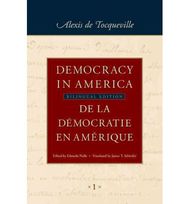
Democracy in America ต้นฉบับเป็นภาษาฝรั่งเศส แต่ความโด่งดัง และความสำคัญของหนังสือ ทำให้มีการพิมพ์เผยแพร่ฉบับแปลเป็นภาษาอังกฤษและภาษาอื่นมากมาย การแปลเป็นภาษาอังกฤษก็มีหลากหลายฉบับแปล |
10 Things Bernie Sanders (And Paul Krugman) Should Know About Denmark
|
10 อย่างที่ Bernie Sanders (และ Paul Krugman)
|
|
Presidential Candidate Bernie Sanders’ comments that the US should be like Denmark has gathered media attention including an article by Paul Krugman. This Presidential hopeful eager to win the election describes a Danish utopia with “free” education and health care and that the US would just do it like Denmark.
As an American who has lived in Denmark for the last 5 years, worked in Danish companies, attended Danish universities, and had 2 children in the country, I’d like to shed some light. There are many things the US can learn from Denmark and appreciate about the vital political and economic cooperation between our countries that dates from 1783, as well as the fact that the US has been enriched by many Danish immigrants. But, here are 10 reality checks for the senator from Vermont and the Nobel economist about the so-called Nordic utopia. 1. Education is not “free” in Denmark การศึกษาที่เดนมาร์คไม่ “ฟรี” There is no doubt that a sustainable funding mechanism for college education is an important policy for any modern country, but if one pays upwards in 56% in income tax and 25% in sales tax (including a 105-180% tax on cars) to fund education and other social services, one would not call it “free”. The downside of the Danish model is that many university students take it for granted and take an additional year to complete their studies. Americans who pay outright for their education and compete fiercely to be accepted into school tend to have higher expectations of the universities and teachers. It’s not unsurprising that the US has most of the world’s top universities, and even Denmark’s best universities don’t figure significantly in global rankings. In any event, the decline in fiscal revenues means that Danish universities are under financial pressure, so they are starting to look at American models that involve philanthropy and corporate partnership for sustainability going forward. 2. Healthcare is not a “right” in Denmark การประกันการดูแลสุขภาพไม่ใช่ “สิทธิ์” ในเดนมาร์ค What Americans consider health care is not exactly offered in Denmark. Too many Americans see the health care system as a backstop for lifestyles driven by chronic disease rather than taking primary responsibility for one’s health through proper diet, exercise, and balanced living. Obesity is less pronounced in Denmark because people eat better, take bicycles, and so on. The Danish health care model is weighted toward preventative and catastrophic care, not the daily maintenance of preventable diseases. There is no blank check for prescriptions; Danes pay for them out of pocket, along with dentistry and physical therapy. The Danish model enjoys scale economies from centralization, low overhead, and lack of malpractice insurance and litigation, but the universe of health care products and services is limited. Moreover, where physicians are not essential, other health care professionals perform procedures. Childbirth in Denmark, overseen by midwives , costs about one-fifth that of the US. Having no complications, I left the hospital a few hours after my son’s birth, and a midwife came to my home the next day. 3. Family leave policies are doable because they scale with salaries and businesses are not overburdened with health care premiums นโยบายลาพักงานเพื่อครอบครัวทำได้เพราะจะลดเงินเดือนตามส่วน และภาคธุรกิจจะไม่ต้องรับภาระค่าประกันสุขภาพพนักงานจนเกินขนาด The 12 month Danish family leave benefit is funded by a tax on all employees, regardless of gender. This is a logical way to fund a standardized family leave policy. In general Danish businesses support it as they are not unduly burdened by other payroll taxes such as health care premiums. Additionally Danish businesses enjoy a lower corporate tax rate than American companies as well as rebates on sales tax. 4. The Danish welfare model works in part because of high level of transparency in government รูปแบบการสวัสดิการสังคมของเดนมาร์คได้ผลส่วนหนึ่งเพราะมีความโปร่งใสสูงในรัฐบาล Denmark was the world’s most transparent, least corrupt country in 2014 and has been ranked highly for years. Among other rules and norms, a transparency initiative adopted in 2009 requires political representatives to disclose their monthly spending, activities in entertainment, travel expenses, received gifts, official representations, and prospective official activities. This is an effective way for citizens to keep an eye on their leaders. Such sunlight would be a boon to American governance. The situation in which special interest groups can lobby the FCC and their communications cannot be accessed even with the Freedom of Information Act would be an area where the US could improve transparency. 5. The Danish welfare model works in part because of high level of digitization in government รูปแบบการสวัสดิการสังคมของเดนมาร์คได้ผลส่วนหนึ่งเพราะรัฐบาลมีการบริหารจัดการในระบบดิจิตอลระดับสูง Delivery of social services is enabled by digitization. A single system for all taxes and benefits is organized under a person’s social security number and is tested to eliminate fraud. This streamlined model actually reduces the need for government workers, and Denmark employs fewer in the government to deliver the same services on account of the digitization. While many candidates see their policies as a way to hire more government workers, this is not the case in Denmark. The number of government employees, while high, is continually reduced, including a new rule in which all communications with government need to be done electronically, eliminating telephone receptionists at municipal offices. Additionally airport security and emergency response services, traditional areas of government employment, are delivered by private companies in Denmark. 6. There are many parts of the Danish economy where the government has limited involvement, particularly telecommunications มีหลายส่วนในระบบเศรษฐกิจของเดนมาร์ค ที่รัฐบาลมีความจำกัดในการเข้าไปก้าวก่ายแทรกแซง, โดยเฉพาะด้านโทรคมนาคม Denmark recently pushed South Korea out of the top spot to be named world’s most digital nation by the ITU. The country is celebrated for its success to deliver quality telecommunications at competitive prices, but this policy is largely the result of market forces, not government intervention. In sharp contrast to the utility-style policies in other European countries, Danes enjoy high telecom investment per capita, approaching the pre-Title II investment level in the US (The level of US telecommunications investment, a quarter of the world’s total for the last decade, is now on the decline as a result of the FCC’s imposition of 1930s era rules on broadband Internet.). Denmark is one country that recognizes that once liberalization of the telecom market is achieved, it is time to reduce, if not retire, institutions created for achieve the liberalization. As such Denmark’s center left government dismantled the telecom regulator in 2011, noting that little value is added to society by bureaucrats micromanaging telecom networks. Professionals with telecom expertise are better suited develop killer apps in the private and public sector. There are almost no subsidies for telecommunication in Denmark. Danes understand that limited public funds should be prioritized today for the old, sick, youth, and poor, not squandered on risky bets for the future. The municipal broadband initiatives touted in the US would be frowned upon by many in Denmark. For a government to set up a firm in a market with private companies is not “competition” and is rightly considered illegal in Denmark. Additionally other areas of infrastructure are targeted for liberalization, as it recognized to improve cost efficiency and consumer value 7. High quality social services delivered by the government require that people have trust in the government การบริการสังคมในระดับคุณภาพสูงที่รัฐบาลจัดให้จำต้องได้รับความเชื่อใจจากประชาชน Having the ability to verify the value they get for their money, Danes in general enjoy a higher sense of trust in the government than Americans and can thus accept that certain services are delivered by the government. Americans pay middle to high tax rates but in many instances, don’t get value for money and generally don’t trust the government. Therefore it is understandable that Americans do not want to pay any more in taxes. If the status quo isn’t working, it doesn’t help to give the broken system any more money. 8. Denmark has a state church เดนมาร์คมีศาสนาประจำชาติ (Church of Denmark) Americans cherish the separation of church and state for good reason. While Danes have religious freedom, 78 percent are members of the Church of Denmark, and this institution is responsible for registering all people in the country at birth, regardless of religion. The exception is the province of Southern Jutland, where the municipality maintains the register. There is an image of a Crucifix on page 2 of the Danish passport. By default, all people pay taxes to the Church. They can opt out, but then they face limited options for burial. Such religious, historical, cultural factors play a role in shaping society, and social policies cannot be understood, let alone replicated, without proper attention to this context. 9. Cooperation between political parties is the hallmark of Danish politics จุดเด่นของการเมืองเดนมาร์คคือการที่พรรคการเมืองทุกพรรคให้ความร่วมมือแก่กันและกันดี Even with just 5.5 million people, there are dozens of political parties in Denmark. They form coalitions with each national election and succeed to implement change and reform, like the recent primary school overhaul accomplished in just one year. This contrasts the unprecedented level of rancor between political parties in the US, inflamed in part by partisanship as exemplified in Mr. Krugman’s column. While some may enjoy battles pitting “liberals” and “conservatives”, it doesn’t necessarily make good policy. 10. The grass isn’t greener somewhere else ที่อื่นใช้ว่าจะอุดมสมบูรณ์กว่าที่บ้านตัวเอง ขณะที่มีคนอเมริกันอยากเป็นเหมือนเดนมาร์คก็มีคนเดนมาร์คอยากให้ประเทศตนเองเป็นเหมือนสหรัฐอเมริกา For all the Americans who say the US should be like Denmark there are Danes who wish that Denmark was more like the USA. They cite America’s high level of entrepreneurship, risk taking, venture capital, social mobility, freedom to fail, among other dynamics. Voters should be more critical of Presidential candidates, recognizing that implementing a single policy taken out of context does not necessarily improve the situation if the existing rules and regulations that create the problem are still in place. So rather than making empty grass is greener promises and espousing policies of countries about which they are clearly uniformed, presidential candidates should focus on building trust and creating transparency. If political leaders had voters’ trust, they would have a better chance to succeed. Reference: http://www.forbes.com/sites/roslynlayton/2015/10/23/10-things-bernie-sanders-and-paul-krugman-should-know-about-denmark/2/#53e32a7639a9 http://www.nytimes.com/2016/02/19/opinion/varieties-of-voodoo.html?rref=collection%2Fcolumn%2Fpaul-krugman&action=click&contentCollection=opinion®ion=stream&module=stream_unit&version=latest&contentPlacement=1&pgtype=collection Picture credit: The Huffington Post
This news and other reports from The Huffington Post shows Donald Trump's lack of temperament to be Commander in Chief and President of the United States, let alone leader of the free world.
Donald Trump’s critics are starting to get under his skin. Speaking at a rally in Davenport, Iowa, on Thursday, the GOP presidential nominee fumed about the criticism he was receiving from speakers at the Democratic National Convention in Philadelphia. “I mean, the things that were said about me,” Trump told the crowd. “I was going to hit a number of those speakers so hard their heads would spin, they’d never recover!” What began as Trump griping, however, quickly turned menacing. “I was going to hit one guy in particular, a very little guy. I was going to hit this guy so hard his head would spin. He wouldn’t know what the hell happened.” Trump never named his target, but he seemed to confirm in a tweet Friday morning that it was former New York City Mayor Michael Bloomberg, one of the DNC speakers. Bloomberg, a billionaire former Republican who is now an independent, took aim at Trump’s business record during his convention speech. “Trump says he wants to run the nation like he’s run his business,” Bloomberg told the audience. “God help us.”
Bloomberg’s criticism seemed to take Trump by surprise. “He came out of nowhere!” Trump said Thursday night. “They made deals with me, [told me] ‘Would you help me with this? Would you make this deal and solve this problem?’ I solved the problem,” the former reality TV star said, practically spitting out the words. The angrier and more threatening Trump became, the more his audience loved it, interrupting his rant several times to applaud. Trump also noted how “certain people” had failed to endorse him because he had hit them “so hard” in the past: “That’s why I still don’t have certain people endorsing me, they still haven’t recovered.” Texas Sen. Ted Cruz and Ohio Gov. John Kasich are some of the most prominent Republicans who have yet to endorse Trump. Both were his rivals in the GOP primary and have been targets of his bullying. As Trump raged, it gradually became clear that “hitting” people meant viciously insulting them, rather than resorting to actual physical violence. Still, to hear a major party’s presidential nominee using such bloodthirsty language to describe his planned retaliation was chilling. But wanting to hurt people is nothing new for Trump. Earlier this year, he told a crowd to be on the lookout for protesters and to “knock the crap out of them,” adding “I promise you, I will pay for the legal fees.” At another rally in February, Trump spotted a protester and told the crowd he’d “like to punch him in the face.” Yet even as Trump delighted in approval from the rowdy crowd, his comments on Thursday played directly into Democrats’ hands: One of their chief lines of attack against Trump is that his behavior sets a bad example for America’s children. Democratic nominee Hillary Clinton’s campaign has already released an ad featuring a medley of Trump’s nastiest moments. Michael McAuliff contributed reporting. Editor’s note: Donald Trump regularly incites political violence and is a serial liar, rampant xenophobe, racist, misogynist and birther who has repeatedly pledged to ban all Muslims ― 1.6 billion members of an entire religion ― from entering the U.S. http://www.huffingtonpost.com/entry/donald-trump-threat-hit-democrats_us_579b6724e4b0693164c0e3d6 |
Picture credit: The Huffington Post
What is “temperament”, I wonder.
Does he or she have a temperament to be Commander in Chief, President of the United States, and Leader of the Free World? This question has been asked and discussed almost every day throughout the US presidential campaign in 2016. The following definition from the Oxford English Dictionary further enlightens me. It confirms that Donald J. Trump doesn’t have it. Hillary R. Clinton does have the temperament to be the Commander in Chief, President of the United States, and one of the leaders of the free world. temperament, n. (ˈtɛmpərəmənt) Also 5 temperment. [ad. L. temperāmentum due mixture, f. temperāre to temper: see -ment. So Fr. tempérament (16th c. in Godef. Compl.).] I. †1. A moderate and proportionable mixture of elements in a compound; the condition in which elements are combined in their due proportions. ? a 1412 Lydg. Two Merch. 303 Yiff‥heete or blood passe his temperament, In to a fevere anoon a man it leedith. 1576 Newton Lemnie's Complex. (1633) 50 Crasis or Temperament‥is an agreement, and conveniency of the first qualities and Elements among themselves: Or, an equall mixture or proportion of the qualities of the Elements, wherein no excesse blame-worthy or faulty is to be found. 1658 Phillips, Temperament, a moderate and proportionable mixture of any thing, but more peculiarly of the four humours of the body. 1684 tr. Bonet's Merc. Compit. iv. 124 The cure of a wasting Flux‥consists in the restitution of the temperament. 1684 J. P. tr. Frambresar. Art Physick i. 18 A Temperament is a proportion of the four chief Elementary Qualities proper for the true exercise of the Natural Functions. †2. State or condition with respect to the proportion of ingredients or manner of mixing; consistence, composition; mixture. Obs. 1471 Ripley Comp. Alch. iv. xiv. in Ashm. Theat. Chem. Brit. (1652) 147 A temperament not so thyk as the Body ys, Nother so thyn as Water. 1610 P. Barrough Meth. Physick viii. (1639) 469 Boyle it again until it come to the temperament of an ointment. 1641 Milton Reform. ii. Wks. 1851 III. 57 The best founded Commonwealths‥have aym'd at a certaine mixture and temperament, partaking the severall vertues of each other State. 1660 N. Ingelo Bentiv. & Ur. ii. (1682) 203 That the Soul is not a Temperament of Corporeal Humours is manifest. a 1673 J. Caryl in Spurgeon Treas. Dav. Ps. lxvi. 12 A due temperament of heat and cold, of dryness and moistness. II. †3. In the natural philosophy of the Middle Ages: The combination of supposed qualities (hot or cold, moist or dry) in a certain proportion, determining the nature of a plant or other body (= complexion n. 1); characteristic nature; known spec. as universal temperament (cf. 6). Obs. 1471 Ripley Comp. Alch. i. xviii. in Ashm. Theat. Chem. Brit. (1652) 133 For soe to temperment ys brought our Stone, And Natures contraryose, fower be made one. 1578 Lyte Dodoens i. lxvi. 97 Some men write of this herbe [Water Plantayne], that it is of temperament colde and dry. 1612 Woodall Surg. Mate Wks. (1653) 209 Let no man attribute to all salts one temperament. 1665 G. Havers P. della Valle's Trav. E. India 70 Of temperament, 'tis held to be hot, and good to promote digestion. a 1677 Hale Prim. Orig. Man. ii. iv. 153 The experience of various temperaments and operations of those Herbs. 4. The condition of the weather or climate as resulting from the different combinations of the qualities, heat or cold, dryness or humidity; climate. Obs. or arch. 1610 P. Barrough Meth. Physick iv. xiii. (1639) 245 Of all temperaments of the aire, the worst is that which is hot and moist. 1684 R. Waller Nat. Exper. 10 Not onely from the season of the Year, and temperament of the Air, but from the Nature of the Soils and Countries themselves. 1713 Derham Phys.-Theol. i. ii. 17 The Cause assigned to malignant, epidemical Diseases;—and that is, an hot and moist Temperament of the Air. 1822–34 Good's Study Med. (ed. 4) I. 459 Change of air‥where the difference of temperament, or even of temperature, can be rendered very considerable. 1875 Jowett Plato (ed. 2) I. 492 The temperament of their seasons is such that they have no disease. †5. Condition with regard to warmth or coldness; = temperature 7. Obs. 1658 A. Fox Würtz' Surg. iv. i. 304 Wound Unguents and wound Plaisters should alwaies stand in one temperament. a 1704 Locke Elem. Nat. Phil. xi. (1754) 51 Bodies are denominated hot and cold in proportion to the present temperament of that part of our body to which they are applied. 1741 Compl. Fam.-Piece ii. iii. 352 To keep up your Heat to the same Temperament. 1799 Phil. Mag. III. 419 A given quantity of cold water, or water of any given temperament. 6. In mediæval physiology: The combination of the four cardinal humours (see humour n. 2 b) of the body, by the relative proportion of which the physical and mental constitution were held to be determined; known spec. as animal temperament; also, The bodily habit attributed to this, as a sanguine, choleric, phlegmatic, or melancholic temperament (see the adjs.). See temper n. 8. In modern use the term temperament and the names of the four temperaments continue, without any theory of combination of humours. 1628 Feltham Resolves ii. [i.] xxx. 95 Though the soule be not caused by the body; yet in the generall it followes the temperament of it. 1652 Bp. Hall Invisible World ii. §1 Galen was not a better Physician than an ill Divine, while he determines the soul to be the complexion and temperament of the prime qualities. 1657 Tomlinson Renou's Disp. 10 That [Medicament]‥which‥doth work a manifest mutation on our bodies,‥either in temperament, in matter or form. 1676 Dryden Aurengzebe Ded., Our Minds are perpetually wrought on by the Temperaments of our Bodies. 1727–41 Chambers Cycl. s.v., The ancient physicians brought these animal temperaments to correspond with the universal temperament‥: the sanguine temperament was supposed to coincide with hot and moist, the phlegmatic with cold and moist [etc.]. 1818 T. L. Peacock Nightmare Abb. i, This gentleman was naturally of an atrabilarious temperament. 1836 A. Walker Beauty in Wom. 202 The ancients classed individuals in one or other of four temperaments, founded on the hypothesis of four humours,‥the red part [of the blood], phlegm, yellow, and black bile.‥ Hence were derived the names of the sanguine, the phlegmatic, the choleric, and the melancholic temperaments. 1843 R. J. Graves Syst. Clin. Med. xxxi. 421 Edward Fitzgerald, labourer,‥temperament sanguineous. 7. Constitution or habit of mind, esp. as depending upon or connected with physical constitution; natural disposition; = temper n. 9. 1821 Byron Juan iii. liii, He was a man of a strange temperament. 1842 Mrs. Browning Grk. Chr. Poets 135 The poetic temperament. 1843 Lytton Last Bar. iii. v, Despite this general smoothness of mien, his temperament was naturally irritable [and] quick. 1856 Emerson Eng. Traits, Truth Wks. (Bohn) II. 55 A slow temperament makes them less rapid and ready than other countrymen. 1868 M. E. Braddon Dead Sea Fr. III. v. 64 Visions‥such‥as the man of sanguine temperament can always evolve. 1873 Hamerton Intell. Life i. iv. (1875) 25 The active temperament likes physical action for its own sake. 1891 Speaker 2 May 534/1 The unbiassed temperament which is essential to the true historian. 1894 W. B. Carpenter Son of Man amg. Sons of Men v, Temperament is a convenient phrase to describe those qualities and dispositions which belong to him from birth. III. The action or fact of tempering. 8. Moderating, moderation; lightening, alleviation, mitigation; due regulation. Obs. or arch. 1475 Rolls of Parlt. VI. 144/2 That a dewe moderation and temperament be observed. 1576 Newton Lemnie's Complex. (1633) 2 Unlesse he have the knowledge of his owne body, and be ripe and skilfull in the temperament thereof. 1697 Bp. Patrick Comm. Exod. xxii. 11 But there were some Temperaments of this Law; for every Man was not admitted to purge himself by an Oath. 1861 Temple Bar Mag. IV. 54 That a certain temperament of speed was ensured. 9. The action of duly combining or adjusting different principles, claims, etc.; adjustment, compromise. Obs. or arch. 1660 Trial Regic. 12 There is that excellent Temperament in our laws, that‥the King cannot rule, but by His Laws. 1678 Sir G. Mackenzie Crim. Laws Scot. ii. xxiv. §6 (1699) 261 By this just Temperament, the Interest of the Common⁓wealth, and the Imbicility of Minors are both salved. 1686 F. Spence tr. Varillas' Ho. Medicis 52 The friends of Piero‥propounded a temperament which equally fitted the king of Naples and duke of Milan's turn. 1790 Burke Fr. Rev. 86 These admit no temperament and no compromise. 1794 ― Corr. (1844) IV. 253 There is no medium,—there is no temperament, there is no compromise with Jacobinism. 1818 Hallam Mid. Ages (1872) II. iv. 43 As a fortunate temperament of law and justice with the royal authority. b. A middle course or state between extremes of any kind; a medium, mean. Obs. or arch. 1604 R. Cawdrey Table Alph., Temperament, temperatenesse, meane, or due proportion. 1656 Blount Glossogr., Temperament,‥a moderation, mean or measure. 1697 tr. C'tess D'Aunoy's Trav. (1706) 45 Wearied and tired, roasted by the heat of the Sun, or frozen by the Snows (for there is seldom any Temperament between these Two Extreams). 1741 Middleton Cicero II. xi. 476 Rewards and punishments; in which‥as in every thing else, a certain medium and temperament is to be observed. 1823 Bentham Not Paul 249 The causes‥of this temperament—this mezzo termino—this middle course. 1827 Hallam Const. Hist. (1876) I. ii. §4. 88 A judicious temperament, which the reformers would have done well to adopt in some other points. 10. Mus. The adjustment of the intervals of the scale (in the tuning of instruments of fixed intonation, as keyboard instruments), so as to adapt them to the purposes of practical harmony: consisting in slight variations of the pitch of the notes from true or ‘just’ intonation in order to make them available in different keys; a particular system of doing this. (Sometimes extended to any system of tuning, including that of just intonation.) The chief temperaments that have been practically used are mean-tone temperament (see mean tone); and equal temperament (now almost universal), in which the octave is divided into twelve (theoretically) equal semitones, so that the variations of pitch are evenly distributed throughout all keys. 1727–41 Chambers Cycl., Temperament,‥in music, denotes a rectifying or mending the false or imperfect concords, by transferring to them part of the beauty of the perfect ones. 1788 Cavallo in Phil. Trans. LXXVIII. 242 This alteration of the just lengths of strings, necessary for adapting them to several key-notes, is called the temperament. 1881 Broadhouse Mus. Acoustics 354 Mean tone temperament was perfected by Salinas, a.d. 1577. Ibid. 356 The principle usually adopted at the present day for all keyed instruments is that called ‘Equal Temperament’, which professes to divide the octave into twelve exactly equal parts, though it does not actually so divide it. 1898 Stainer & Barrett Dict. Mus. Terms 437/1 The question of melodic progressions, as affecting the excellence of temperaments, is too extensive for our limits. Thaivision Pak Chong, Thailand 31 July 2016 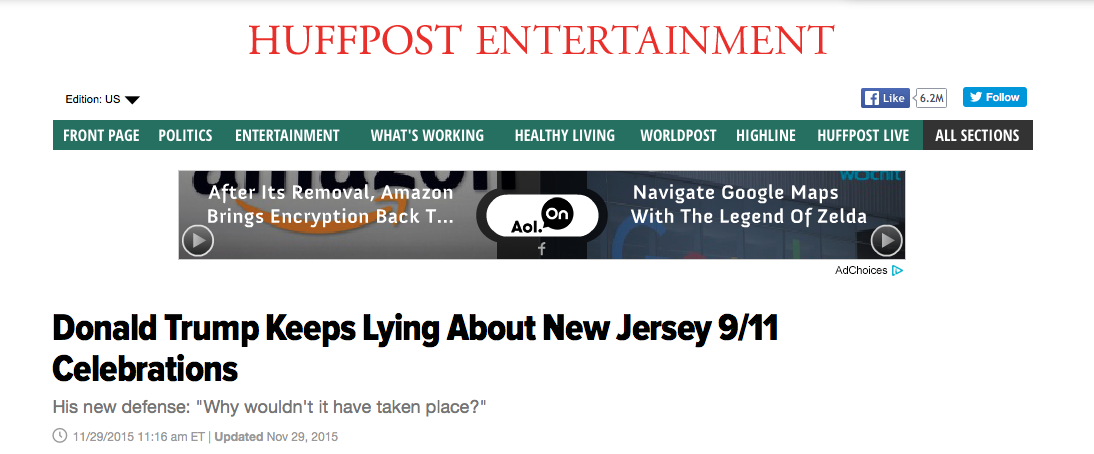
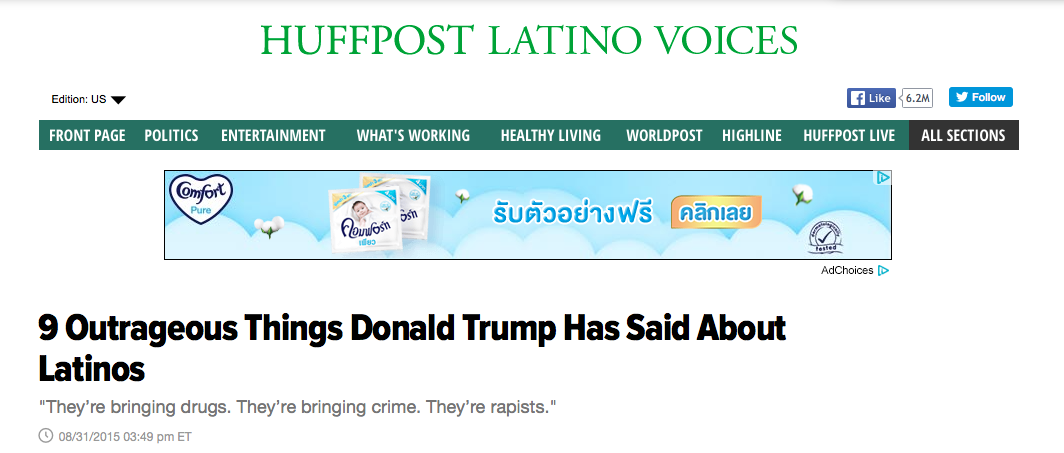

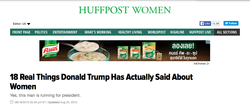
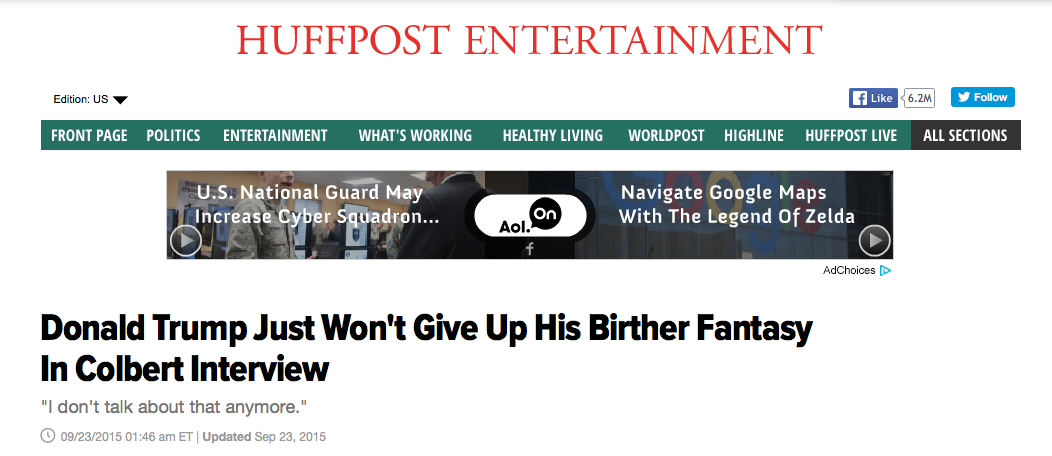
http://www.huffingtonpost.com/entry/donald-trump-stephen-colbert-birther_us_56022a33e4b00310edf92f7a
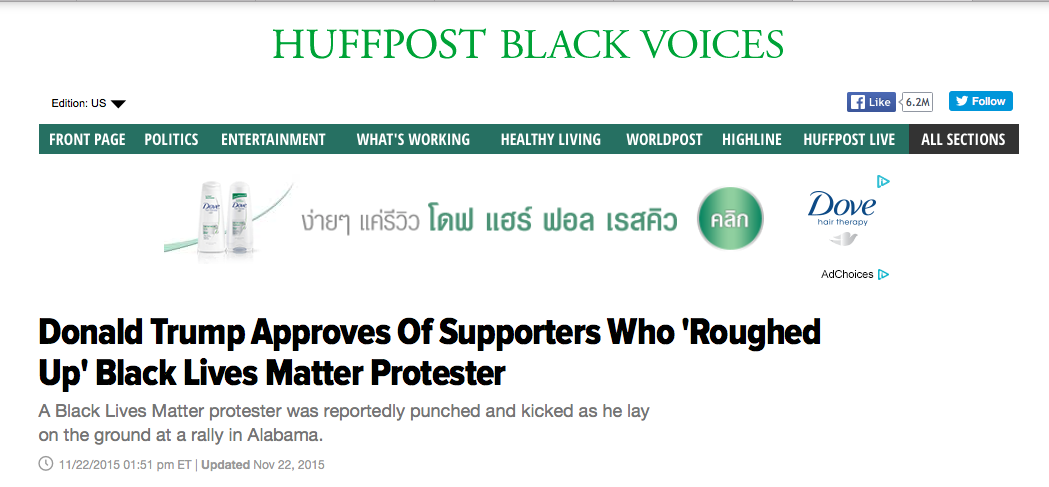
|

